mNo edit summary Tag: Visual edit |
No edit summary |
||
| Line 345: | Line 345: | ||
However, his distrust for divine beings remains intact, opting to avoid interaction with the Norse Gods whenever possible, even when they (like [[Freya]]) try to befriend and help him. He is also shown to still harbor resentment towards the gods of Olympus, promptly telling the spirit of Athena to leave his head the moment she appears. He likewise reassures her that, while he is still a monster, he is no longer ''her'' monster. |
However, his distrust for divine beings remains intact, opting to avoid interaction with the Norse Gods whenever possible, even when they (like [[Freya]]) try to befriend and help him. He is also shown to still harbor resentment towards the gods of Olympus, promptly telling the spirit of Athena to leave his head the moment she appears. He likewise reassures her that, while he is still a monster, he is no longer ''her'' monster. |
||
| − | Kratos now only kills out of self-defense and |
+ | Kratos now only kills out of self-defense and does not see the point in killing a weakened enemy. He even tries to be the voice of reason when Atreus finds out he is a god and lets it go to his head. Though he does not exactly like being around [[Brok]] and [[Sindri]], Kratos is never rude or ill-natured around them and even allows them to work on his weaponry and gear, he was even shocked when Atreus asked why Brok is blue and when he badmouths Sindri, showing that he is at least sensitive enough to know when to not make an enemy. |
| − | Due to his slaying of the Gods of Olympus, Kratos now understands that vengeance will not bring him or others peace, even trying to talk [[Baldur]] out of killing Freya and then killing him when he attempts to do so to try and end the cycle of children killing their parents. When Freya threatens Kratos and swears vengeance against him, he does not retaliate in anger and simply replies that she |
+ | Due to his slaying of the Gods of Olympus, Kratos now understands that vengeance will not bring him or others peace, even trying to talk [[Baldur]] out of killing Freya and then killing him when he attempts to do so to try and end the cycle of children killing their parents. When Freya threatens Kratos and swears vengeance against him, he does not retaliate in anger and simply replies that she does not know him, showing maturity and self-control. |
Unbeknownst to Kratos, he and Atreus are destined to have a part in Ragnarok. |
Unbeknownst to Kratos, he and Atreus are destined to have a part in Ragnarok. |
||
Revision as of 09:14, 6 May 2018
| “ | The hands of death could not defeat me. The sisters of fate could not hold me. And you will not see the end of this day. I will have my revenge! | ” |
–Kratos to Zeus | ||
Template:War Box
Kratos is the main protagonist and anti-hero of the God of War series. Born a Spartan, Kratos held the military rank of General, and would ascend to being a God before exacting his revenge on the Olympians who betrayed him.
Biography
Early life
- See also: God of War, God of War (Comics), Ghost of Sparta, and God of War II
Born in the Greek city-state of Sparta, Kratos is the demigod son of Zeus and a mortal woman named Callisto, although he would remain unaware of who his father was for most of his life. Outraged at Zeus for fathering yet another bastard child, Hera ordered Kratos' execution on the day he was born, but the King of the Gods took pity on the child and refused, leaving him in Sparta to be raised by Callisto.
Like all Spartan youth, Kratos was monitored and trained for combat by the Spartan authorities; those who were deemed fit were to stay and be trained as Spartan warriors, while those who were deemed unfit would be sent to the mountains (probably Mount Taygetos) to fend for themselves. Already feisty and aggressive at a young age, Kratos trained together with his younger brother, Deimos, as they both dreamed of joining the Spartan army when they grew up. Around this time, Zeus began to hear prophecies foretelling his demise at the hands of one of his sons, a "marked warrior". Hoping to circumvent the cycle of patricide before it was too late, Zeus sent Ares and Athena to hunt down and dispose of the boy who would one day rise up against him. Ares, noticing Deimos' strange birthmarks, decided to invade Sparta with an army of centaurs and take him to Thanatos, the God of Death. Kratos tried to save his brother, but Ares punched him into a pile of wood, leaving him with a permanent scar over his right eye.
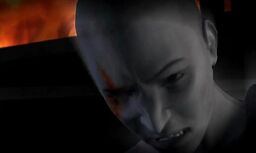
Kratos' scar, delivered by Ares.
Insulted by the mortal's defiance, Ares prepared to kill the young Spartan, but was stopped by Athena. The Goddess reminded him that they had what they were looking for, apologizing to Kratos before disappearing into the flames. The loss of his brother left an indelible mark on Kratos, as he vowed to never falter again. In honor of his brother, Kratos had himself tattooed in the exact image of Deimos' birthmark. Kratos would later forget that it was Ares and Athena who took his brother from him, and wouldn't realize it until after Ares' death.
As Kratos came of age, he became a respected member of the Spartan army, eventually marrying Lysandra and siring a daughter, Calliope.
Quest for the Ambrosia
Shortly after her birth, Calliope contracted a plague, causing the Spartan authorities to deem her weak. Spartan law required that she be thrown into a chasm and left to die. Determined to save his daughter, Kratos set out on a journey for the Ambrosia after hearing from an elder of its exceptional healing capabilities, not knowing that Ares, the God of War, had chosen him to be his champion in the wager of the Gods, a contest with the ultimate goal being the capture of the Ambrosia; the victor would have statues erected in their honor all throughout Greece. A battalion of Spartans accompanied Kratos on his quest, including Captain Nikos. Along the way, he encountered a healer who gave him the Flames of Apollo.
Kratos eventually encountered Poseidon's champion, Herodius, and killed him as the Spartans conquered his army and stole their ship. Enraged at Kratos for costing him the wager, Poseidon unleashed a handful of hazards at sea in the hopes of killing him, but failed. Later on, Kratos encountered Artemis' champion, Pothia, and killed her as well, with her army also falling victim to the Spartans, although Artemis did not retaliate. In fear that Kratos would defeat his champion, Alrik the Barbarian King, Hades sent a torrent of fire through the sky. Although he failed to kill Kratos, he succeeded in killing many of Kratos' men, including Captain Nikos. As he found the Ambrosia, Kratos encountered Helios' Champion and killed him as well.
Alrik and his Barbarian army battled the Spartans for the Ambrosia, as Alrik's Father was very ill and in need of the elixir. After a grueling battle between the two leaders, Kratos successfully captured the Ambrosia at the cost of his own men and summoned an army of Rocs to continuously torture Alrik. Kratos then returned to Sparta and healed Calliope, obtaining the rank of 'Captain' from the King of Sparta.
Birth of the Ghost
As a general, Kratos won battles through brutal, but effective tactics. However, his pride and hunger for power grew greater with every victory. Despite Lysandra's pleas, Kratos vowed to continue his bloody conquests "until the glory of Sparta is known throughout the world", spending time with his family only when he was able to return to Sparta.
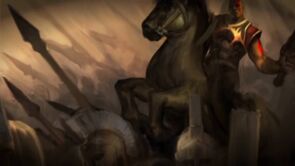
Kratos leading Spartan troops
Kratos and his army finally met their match when they encountered the merciless Barbarian tribes from the East, led by Kratos' old enemy, Alrik. Outnumbered and overpowered, the Spartans quickly found themselves on the losing end of the battle, with Kratos himself left at the mercy of Alrik the Barbarian King, who sought revenge against Kratos for inadvertently causing the death of his father. In desperation, Kratos called out to Ares, the God of War, pledging his allegiance in exchange for victory. Ares accepted the offer, proceeding to kill all of the Barbarians, including Alrik, and give Kratos the Blades of Chaos as a sign of his servitude.
For a time, Kratos served Ares loyally, raiding villages, slaughtering innocents, and spreading chaos in his name. Under the God of War's influence, Kratos became utterly ruthless and gradually lost any semblance of the humanity he once had. One day, during a raid on a village of Athena's followers, Ares secretly transported Lysandra and Calliope to a nearby temple. Ignoring the warnings of the village oracle, Kratos entered the temple and slaughtered everybody inside in a fit of blind rage, including his wife and child (whom he believed were still in Sparta). Ares justified this as a means of severing Kratos' remaining attachments to the world of mortals, thereby molding him into the perfect warrior. Stricken with horror and grief at what he had done, Kratos left the bodies of his family to be burned within the temple as he cursed Ares' name, renouncing his allegiance to the God of War. The oracle cursed Kratos, forcing him to forever wear the ashes of his dead family on his skin.
From that day forward, Kratos was known as The Ghost of Sparta; his skin now 'pale as the moon' from the ashes that coated him. To other mortals, he was now marked by his ghostly white skin - the knowledge of his past actions often repulsed them to the point where they would rather die than allow him to save their lives. He became known as the personification of cruelty and selfishness.
Redemption and Vengeance
- See also: God of War: Ascension
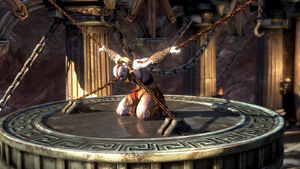
Kratos imprisoned by the Furies
For breaking his oath, Ares ordered The Furies to hunt down the Ghost of Sparta and force him to once again serve the God of War. Meanwhile, Kratos finds himself in the abandoned village of Kirra, where he is trapped in an illusion of his home in Sparta, with his blood oath inhibiting the memories of him killing his wife and daughter. The Furies' oath-keeper, Orkos, appeared before him and encouraged him to see past the hallucination, using Lysandra's necklace and ring to break it. Although Kratos distrusted him, he followed Orkos' instruction to seek out Aletheia, the Oracle at Delphi. She had earlier been captured by Pollux and Castor, but Kratos killed them both and took the Amulet of Uroborus. He spoke with the dying oracle, who revealed Ares' intentions of using Kratos to overthrow Zeus and become the new king of the gods. Kratos traveled back to Kirra, where he encountered Orkos once again. The oath keeper revealed that he is the son of Ares and Alecto, one of the three Furies.
Orkos explained Ares' plan to Kratos. As Zeus had forbidden the Gods from waging war on one another, Ares sought to breed a warrior capable of destroying Zeus in his stead, so that Ares may usurp him and rule Olympus for himself. Disappointed in Orkos' complete lack of fighting skills, Ares disowned his son, and Orkos became oath keeper of the Furies in the hopes of pleasing his mother, Alecto. Ares saw in Kratos the makings of the warrior he needed to overthrow Zeus, and for that reason, he helped him against the Barbarians that day. The murder of his family was meant to be one of three "tests" that would bind Kratos to Ares' will: the slaughter of one's enemies, the slaughter of innocents, and the slaughter of one's own family. Orkos did his mother's bidding as the oath keeper and did not question her until Ares tricked Kratos into killing his family. Armed with this knowledge, Kratos took a ship to Delos.
Arriving at the island of Delos, Kratos traversed a giant, ruined statue of Apollo, where he was attacked by all three Furies. In the ensuing confrontation, Kratos manages to cut off Megaera's arm, but Alecto uses her power to capture him. Orkos appears and frees Kratos, escorting him to another location, with Alecto vowing that he will never succeed. After a perilous journey, Kratos uses the Amulet of Uroborus to fully restore the statue and retrieve the Eyes from the Lantern. But after completing the Trials of Archimedes, he is once again ambushed by the Furies, who take him prisoner and steal both the Eyes and the Amulet.
For two weeks, the Furies tortured Kratos in the Prison of the Damned. The Spartan managed to free himself when Megaera went too far with her torture and pursued her through the prison. She and Tisiphone attempted to misdirect him, as a building he enters is projected as a brothel. When he goes to sleep with a woman, he spots the ring on her finger and realizes that it is an illusion. He responds by tackling Tisiphone, but Megaera intervenes, insisting that Kratos belongs to her. Megaera released insects into Aegaeon's hands and mouth, mutating them into insect-titan hybrids. As Kratos retrieves the Amulet of Uroboros by killing Megaera and the Hecatonchires, Tisiphone creates an illusion of him being honored by the King of Sparta. Kratos sees through it and, progressing further into the prison, finds the Scribe of Hecatonchires, who was the first mortal to ever be imprisoned by the Furies. He reveals that the Furies were originally fair in their punishment, but became ruthless under Ares' influence.
Making his way to Alecto's chamber, Kratos retrieved the Oath Stone from Tisiphone's pet bird, Daimon. Upon entering the chamber, the Furies project another illusion, this time of Kratos' home in Sparta. He is nearly taken in by this, for he saw his wife and daughter again. He came close to sleeping with the image of Lysandra, but soon notices the ring on her finger, revealing her to be Alecto. She then tries to convince Kratos that he could live in this illusion forever if he rejoined Ares; however, noticing the Eyes of Truth hanging on her hip, he refused, preferring the truth to living a lie. Enraged, Alecto drops the illusion and threatens to execute him if he would not serve Ares. Kratos breaks free of her sludge trap and snatches the Eyes from Alecto, who retreated back into her sanctum before she realized they were gone. Tisiphone joined Alecto as Kratos advanced on the remaining Furies. They created an illusion of a massive whirlpool, with Alecto transforming into a horrific sea monster.
Using the Eyes, Kratos broke through the Furies' illusions and forced Alecto back into her human form. As he advanced on the Fury Queen, Tisiphone dispatched Daimon once more, but Kratos simply used the Eyes to destroy the bird. He proceeded to strike Tisiphone, shapeshifting between the forms of the King and Kratos himself, as she belittled him. As he wrapped his hands around her throat, Tisiphone transformed into the form of Lysandra, causing Kratos to briefly hesitate. Tisiphone then changed into the Village Oracle, telling Kratos that his family was not there by mere chance the night he killed them before Kratos snaps her neck. With only Alecto left, Kratos drew his blades. The Fury Queen coldly tells him that the truth would only bring him pain before he plunges his blades into her chest. With her last breath, Alecto spitefully promises that her death would change nothing.
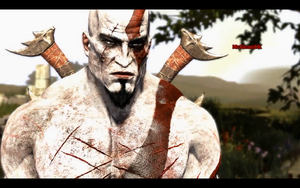
Kratos after his battle with The Furies
With all three of the Furies dead, Kratos returned to his home in Sparta, where Orkos congratulated him on his victory. At the same time, he also revealed that he was made the new oath keeper, thereby maintaining Kratos' bond with Ares. He begged Kratos to give him an honorable death, as it would free them both from the God, to which Kratos initially refused, proclaiming that no more innocent blood should be spilled. Orkos' continuing pleas ultimately forced Kratos' hand. With this act, Kratos experienced the first of many nightmares, previously masked by his bond to Ares: this was the price he had to pay for breaking his oath. He also discovered his path to redemption through continual service to Olympus. Kratos proceeded to burn down his house, with the corpse of Orkos inside it.
Service to the Gods
- See also: Chains of Olympus
| “ | Is this all you would have me do? Is there nothing else!? | ” |
–Kratos, serving the gods. | ||
For the next decade, Kratos faithfully served the Gods of Olympus in whatever tasks they required of him. During the fifth year of his atonement, he joined the army of Attica in their struggle against the invading Persian Army and the great beast they brought forth, the Basilisk. After a lengthy battle, Kratos killed both the Persian King and the Basilisk, before asking the gods if they wished him to do more in his servitude. At that moment, the Ghost of Sparta saw the Sun fall from the sky and vanish, leaving the world in darkness.
Sensing a plot at work, Kratos followed the last remnants of light on the horizon, eventually reaching the Temple of Helios and the city of Marathon. Upon consulting with Athena, Kratos realized that Helios, the God of the Sun, had been kidnapped by an unknown force, allowing Morpheus, the God of Dreams, to put the other Olympians in a deep slumber. With the Gods of Olympus incapacitated, Kratos was tasked with finding and rescuing Helios before Morpheus could seize control of the land by covering Greece under his Black Fog. Fighting through Morpheus' minions, Kratos entered the temple of the Sun God and, after learning of the events that transpired, was tasked by Eos, the sister of Helios, to awaken her brother's Fire Steeds, which would take Kratos to where Helios was being held prisoner.
Having awakened Helios' Steeds, Kratos was taken to the Underworld where he saw Helios' glowing light in the distance, right before the Pillar of the World. Kratos fought his way through Hades' domain, acquired the mighty Gauntlet of Zeus, entered Tartarus and killed Charon, the ferryman of the dead. Kratos then discovered that the Titan Atlas had somehow escaped Tartarus and captured Helios.
Throughout his journey, Kratos was plagued by illusions of his daughter, Calliope, and the song she played on the flute that he once gave to her. When Kratos reached the Pillar of the World and the Temple of Persephone that lay nearby, he had already forgotten his task, thinking only of reuniting with his daughter. He encountered Persephone, the Queen of the Underworld who had been kidnapped by Hades and forced to wed him. She revealed that Kratos could be with his daughter again if he relinquished all of his powers to the Forsaken Tree. Desperate to see his daughter again, Kratos did as she asked, and she allowed him to enter the Elysium fields where he met with his daughter and was seen happy for the first time since he became the Ghost of Sparta.
Persephone appeared before him, revealing that it was she who freed Atlas and asked him to capture Helios. With his help, she devised a scheme to destroy the Pillar of the World, thus killing the Gods of Olympus and all of mankind as well. She taunted Kratos with the knowledge that he may live with his daughter for a short period, but would ultimately see her die again upon the completion of her plan. Kratos then forced himself to become the Ghost of Sparta again by killing the innocent souls of Elysium and regaining his powers. Whilst giving pursuit to Persephone, he realized that he would never have the chance to be with his daughter again. As he heard her crying behind him, his hatred for the Gods of Olympus deepened.
An enraged Kratos succeeded in killing Persephone and chaining Atlas to the ground above the Pillar of the World, thus completing his task. Before he left the Underworld, Atlas asked Kratos if he truly believed that the Gods would keep their promise. Kratos replied that it was the only thing he could hope for now since he could not go back to Elysium. With the use of the Fire Steeds, Kratos then escaped the Underworld, but found himself too exhausted from the journey and fell from the Chariot to the ground below. He was saved by Athena and Helios, who stripped him of his powers and equipment, leaving him unconscious upon the cliffs overlooking the Aegean Sea.
The Final Task
- See also: God of War
| “ | Ares, you will die for what you did that night! | ” |
–Kratos | ||
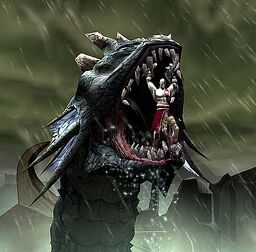
Kratos fighting a head of the Hydra
Ten years after beginning his service to the Olympian gods, Kratos was commissioned with killing the Hydra and bringing peace to the Aegean Sea. Along the way, Poseidon granted him the power of lightning and implored him to use it against the Hydra. After a long and vicious battle, Kratos emerged victorious by impaling the Hydra's front head on the ship's mast. Entering the decaying Hydra's throat, Kratos retrieved a boat key from the ship's Captain. For unexplained reasons, he refused to save his life and instead allowed him to plummet to his death. The Ghost of Sparta celebrated his victory that night with wine and women, but continued to suffer from nightmares of his past deeds. Distraught, he approached one of Athena's statues and asked her when he would be free from his past. She told Kratos that his final task would be to find Pandora's Box and use the power inside it to destroy Ares. Kratos, having finally been granted an opportunity for revenge against the God of War, asked Athena if the gods would take his nightmares away upon completing this task. The goddess, however, refused to provide a clear answer, and instead offered him an intentionally vague promise of forgiving his past sins. Nonetheless, Kratos interpreted this answer as a 'yes', and set sail for Athens anyway.
Arriving at the docks of Athens, Kratos made his way through the besieged city, killing countless minions of Ares in the process. Encountering Aphrodite in a nearby temple, Kratos decapitated the infamous Medusa, Queen of the Gorgons, at her behest. In return, Kratos was granted the power to freeze his enemies where they stand. He later acquired lightning bolts from Zeus as well, using them to strike down a terrified Athenian guard after he refused to lower the bridge, thereby allowing Kratos to cross. Progressing further into the city, he briefly encountered the Athenian Oracle, who was then kidnapped by a pair of Harpies before she could speak to him. Giving chase, he soon found himself outside the Oracle's temple, where he observed a gravedigger (later revealed to be Zeus) digging a grave. Kratos inquired as to who would occupy it, to which the gravedigger answered that Kratos will. The Ghost of Sparta is alarmed by this answer, but the gravedigger reassures him that "all will be revealed in good time, and when all appears to be lost, I will be there to help".
Progressing further into the temple, Kratos finds the Oracle dangling from a nearby cliff and rescues her. She immediately suspects that Kratos is motivated by something other than a desire to do good, and looks through his memories. The Oracle is horrified by Kratos' past deeds, and asks why Athena would ever call on someone like him. Kratos angrily grabs the Oracle by the throat and throws her aside, telling her to stay out of his head.
The Oracle informed Kratos that Pandora's box could be found in Pandora's Temple, located just beyond the Desert of Lost Souls on the back of the Titan Cronos. She warned the Ghost of Sparta that none have ever survived Pandora's temple, but Kratos is unfazed. A statue of Athena appeared before Kratos at the desert entrance, telling him that he must follow the song of the sirens and destroy all three before he can progress further. After doing so, he finds the Titan Horn and uses it to summon Cronos. Kratos begins to climb the Titan, arriving at Pandora's temple three days later. Just outside the temple's entrance, he notices a gatekeeper (who is revealed to be the undead spirit of the first mortal to ever attempt Pandora's temple) tending to a pyre of dead bodies. As punishment for his failure, the gods forced him to watch over the entrance for all eternity, and burn the bodies of any soul foolish enough to try and conquer Pandora's temple. Believing Kratos would fail just like all the others, he disinterestedly wishes the Ghost of Sparta good luck before opening the gates. As the Spartan made his way through the temple, he encountered both Artemis and Hades, from whom he gained the Blade of Artemis and Souls of Hades, respectively. Along the way, he defeats countless monsters (including a giant armored Minotaur), survives impossible traps, and sacrifices a caged Athenian soldier before finally reaching Pandora's box, being the first human ever to do so. However, this did not escape the notice of Ares, who responded by hurling a large broken pillar towards Pandora's Temple, impaling Kratos. The Harpies collected Pandora's Box and took it back to Ares, while Kratos died and fell into the Underworld. As he plummeted to the River Styx, Kratos grabbed hold of the Captain's leg and used it to climb to safety before kicking him down below into the River Styx.
Reaching the top again, Kratos managed to escape the clutches of Hades via the same hole that the Gravedigger had been digging earlier. He tells Kratos that Athena is not the only god watching over him, and that he still has one final task to complete before his sins are forgiven. Journeying through the now destroyed city of Athens, he reacquires Pandora's Box from Ares and uses it to grow tremendously in size and gain a substantial amount of power in order to battle Ares on more even footing. After a vicious fight, Ares traps Kratos in a psychological void where demonic incarnations of himself attempt to kill phantom versions of his family. Kratos successfully fights them off, but watches helplessly as Ares strips him of his Blades of Chaos and used them to kill his family again. Kratos, now distraught and vulnerable, nearly met his end at the hands of Ares, but soon took notice of the Blade of the Gods and used it to finally destroy the God of War.
Though his past had been forgiven, the Gods refused to relieve him of his nightmares. His last bit of hope taken from him, Kratos attempted to commit suicide by jumping from a cliff. However, Athena had a different plan for the Spartan; she saved his life and offered him the now empty throne of the God of War on Olympus. He accepted the offer, sat upon the fallen god's throne, and became the new God of War.
As the God of War
- See also: God of War (Comics), Ghost of Sparta, Betrayal, and God of War II
| “ | My Lord, Kratos! Another city is ready to fall! Soon all will know the glory of Sparta! | ” |
Kratos entered Tartarus once again in search of the Ambrosia in order to destroy it, for the Disciples of Ares desired to use it to resurrect their now dead God. Throughout his journey, Kratos received flashbacks of his first quest for the Ambrosia. Making his way through Tartarus, Kratos encountered and defeated a giant arachnid monster. After pulling his blades out from the beast, Athena spoke to him in an attempt to warn him about new dangers on the path he took once before. Kratos shrugged off her warnings, confident that nothing would stop him.
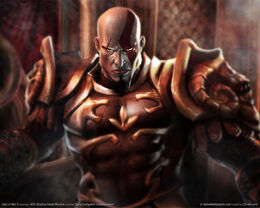
Kratos upon his throne bearing the God Armor
Later, he encountered Athena again and was told by the goddess that it is now the dead he must fear. Again, Kratos ignored her warnings, proceeding to find the dead bodies of Spartan soldiers who had accompanied him on his earlier quest for the Ambrosia. Rising from the dead, they attempted to kill Kratos in retaliation for abandoning them, although he defeated them all. The island then revealed itself to be a monstrous beast named Gyges, who sought revenge against Kratos after one hundred of his arms were burned off in his battle with Helios' Champion. Kratos, however, incinerated Gyges with the Flames of Apollo, destroying the Tree of Life and all of its Ambrosia. He then left the island, knowing that the disciples of Ares would hunt him down for destroying the last hope they had at reviving their fallen God. Sometime later, Kratos experienced visions of his mother being held at the Temple of Poseidon in Atlantis. En route to Poseidon's city, Athena attempted to dissuade Kratos from his mission, but her pleas fell on deaf ears. His ship was then attacked by the Scylla. Chasing the monster off, he received another vision, this time of his childhood training with his brother Deimos.
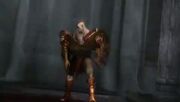
Kratos holds his dying mother in his arms
He entered the temple and encountered his long presumed dead mother Callisto, who assured Kratos that it is really her, to his shock. She then tells him that his father had taken her there and that Deimos is still alive; trapped and tortured in the Domain of Death. Both shocked and angered, Kratos asked who his father was and why she lied to him all those years ago. Before Callisto could tell him, she is transformed into a hideous beast, forcing Kratos to fight and critically wound her. Callisto used her dying moments to thank Kratos for setting her free, and encouraged him to pursue Deimos in Sparta.
Enraged over the gods having taken yet another member of his family, Kratos embarked on a journey to save his brother, defiantly ignoring Athena's orders that he turn back. At one point, Kratos encountered the Titan Thera, imprisoned inside a volcano, who told him he would be incapable of leaving if he did not free her. After forcefully imbuing the Blades of Athena in the Titan's chest, Kratos obtained Thera's Bane and left the volcano. In releasing Thera, Atlantis' fate was sealed.
Upon his descent, he impaled the Scylla, who had been pursuing him relentlessly ever since his arrival, finally defeating the monster. Before returning home, Kratos found himself under attack by Erinys, Thanatos' daughter. Following Erinys' defeat, Kratos returned to Sparta, killing the Piraeus Lion and a Dissenter before entering the Temple of Ares (then in the process of being converted into the Temple of Kratos), where he would find the key to saving his brother. The Spartan then made his way back to the sinking city of Atlantis, although his route was fraught with danger as Poseidon had unleashed an enormous whirlpool at sea and attempted to blast Kratos from the sky in retaliation for the destruction of his city. Kratos survived Poseidon's assault, only to be contacted telepathically by the Sea God via one of his broken statues, warning him that he would pay for what he had done to Atlantis. Sometime later, Athena inadvertently revealed to the Spartan that it was she, along with Ares, who had taken Deimos from him that day, justifying their actions on the grounds that he was a threat to Olympus. This revelation deepened Kratos' hatred for the Gods even further. Proceeding onward, Kratos entered the Domain of Death and the Temple of Thanatos where he finally found his brother Deimos. Kratos set Deimos free, only to be attacked by him, as Deimos blamed Kratos for not helping him when in dire need. Witnessing the battle from close by, Thanatos intervened and snatched Deimos. Barely able to stand from his fight with Deimos, Kratos followed Thanatos to the Suicide Bluffs and quickly rescued Deimos from falling to his death.
After being reunited and reconciling their differences, the Spartan brothers took arms and joined forces against Thanatos. The God of Death taunted the brothers, recalling the oracle's prophecy that a "marked warrior" was destined to destroy Olympus. He comments that Zeus, Ares, and Athena chose the wrong "marked warrior" that day: it was Kratos who should have been taken away, not Deimos. Thanatos then said that it didn't matter anymore, and that nothing Kratos does is of his own choosing. Kratos shouted that no one, not even the gods decide his fate, to which Thanatos laughed and said the gods decide, and the Sisters of Fate make it so, further commenting that Kratos was nothing but a pawn in a game that he didn't know was being played. In a climactic battle, Thanatos took Deimos' life, only to have an enraged Kratos take his in return. Kratos then took the lifeless body of his brother to his grave.

Kratos watching Deimos getting buried
After putting Deimos in a grave dug by the enigmatic Grave Digger, Kratos stated that his brother was now free. He once again attempted to kill himself at the bluffs, but ultimately relented, asking himself what he had become. The Grave Digger, who had been close by, prophetically answered "Death, the Destroyer of Worlds" before vanishing. Athena then pleaded with Kratos to forgive her, and offered to empower him to full Godhood, but saw her pleas ignored, as Kratos promised her that the Gods would pay for their actions.
Kratos began to isolate himself from the other Gods and spent most of his time assisting Sparta in its conquest of Greece. During a siege on an unknown city, he was attacked by Argos, Hera's pet. Before he could defeat the beast, however, an unknown Assassin killed it in his stead, apparently trying to destroy his reputation on Olympus. Kratos pursued the Assassin, but saw his progress halted by the minions of Hades, causing him to believe that the Assassin was Hades in disguise (this notion is further supported by the fact that Hades already resented Kratos for the death of his wife Persephone). The God of War continued his pursuit, only to be stopped by Ceryx, a messenger of the Gods, who allowed the Assassin to escape. On Zeus' orders, Ceryx told Kratos to cease his pursuit. Providing no valid reason, Ceryx only managed to infuriate the God of War. Kratos killed the messenger on the spot, instantly realizing that Zeus would not stand for this action.
When Kratos sent his Spartan soldiers to conquer Rhodes, Athena implored him to stop, as the other Gods grew weary of his destructive behavior. Kratos, as usual, ignored her warning and instead plunged down to the Earth, aiding his army in further destroying the city. An eagle soon appeared and robbed Kratos of his immense size and a significant chunk of his godhood powers, reducing him to the size of an ordinary human. Despite this, he retained some of his god powers, enabling him to easily defeat the warriors of Rhodes. The eagle imbued Kratos' god powers into the Colossus of Rhodes, which was then brought to life.
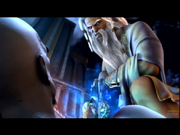
Zeus betrays Kratos
Kratos fought a long and arduous battle with the giant until Zeus offered help in the form of the Blade of Olympus, which he himself used to end the Titan War. Infusing the remainder of his god powers and immortality into the blade, Kratos defeated the Colossus. As he shouted to the heavens, the statue's falling hand crushed him, knocking the Blade of Olympus out of his grasp. Severely wounded, and stripped of all of his powers, Kratos knew his only hope of survival lay with the Blade. Limping towards it, the eagle soon reappeared and revealed itself to be Zeus in disguise (Kratos originally believed Athena was responsible). Zeus informed Kratos that he didn't want to suffer the same fate as Ares, and demanded that Kratos surrender and serve him forever. However, when Kratos refused, Zeus attacked and killed him by driving the Blade into his abdomen. In his dying breath, Kratos swore that Zeus would pay for his treachery.
Changing His Fate
| “ | You will never control your fate, Kratos! | ” |
–Clotho, to Kratos. | ||
Kratos was dragged down by the arms of the Underworld. The Titan Gaia, who had been watching him his entire life, saved Kratos, sealed his wound, and gave him the strength to escape death once again. Climbing out from the Underworld, he instructed the last surviving soldier to return to Sparta and prepare for battle.
Kratos then took Pegasus, a gift from Gaia, and attempted to fly back to Olympus so he could exact his revenge, but discovered that he could no longer enter Olympus, as he was no longer a God. Instead, Gaia instructed Pegasus and Kratos to seek out the Sisters of Fate. She informed him that the Sisters had the power to travel back in time, which he could use to reclaim the Blade of Olympus and take his revenge on Zeus. Kratos first traveled to Typhon's lair, where he met with Prometheus, who begged him to release him from his torment in the Fires of Olympus. Kratos, after stealing Typhon's Bane from the Titan, used it to break Prometheus' last chain, sending him down into the flames, burning him alive and finally releasing him. His ashes granted him the power of the Titans.
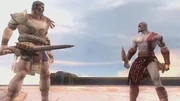
Theseus challenging Kratos to battle.
Kratos then made his way to the Island of Creation, where the Pegasus was attacked by a pack of Griffins. After defeating the undead soldier who led the pack of griffins, Kratos made a death defying leap off of Pegasus and onto the Island. As he continued his journey, he questioned Gaia over her reason for aiding him. Gaia then tells him the story of the Titanomachy and how the Olympians betrayed her and overthrew the Titans. Armed with this knowledge, Kratos continued his quest and soon encountered Theseus, who guarded the Steeds of Time. Theseus laughed and mocked Kratos' quest to destroy Zeus and challenged him to a fight, wanting to see who was the greatest warrior in all of Greece. Theseus was defeated after Kratos skewered him with his own spear and repeatedly slammed the door shut on his head. Kratos then used the Horse Keeper's Key to gain control of the steeds, moving the temple of the sisters of fate closer and connecting the two together.
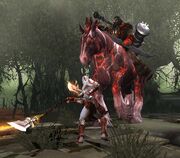
Kratos duels Alrik once more.
Kratos made his way through the Bog of the Forgotten where he encountered an undead foe from his past, the Barbarian King. Having escaped Hades' torment, he traveled to the Island of Creation for two reasons: to change his fate, and exact revenge on Kratos. They engaged in a fierce duel, with Alrik summoning the souls of the dead (including the Captain) with his mighty hammer. Eventually, these souls were either destroyed (again, including the Captain) or absorbed by Alrik, using them to increase his size. Ultimately, Kratos shrunk the king back down, seized Alrik's hammer and used it to crush his skull, killing him once more. Looking upon Alrik's corpse, memories of Kratos' past came back to haunt him, but he pressed on anyway.
Entering Euryale's temple, he obtained the Golden Fleece from a wounded soldier (whom he then sacrificed by throwing his body under a cog, jamming it), which could deflect enemy attacks. Kratos used this weapon to defeat a nearby Cerberus and, eventually, Euryale herself. Enraged at Kratos for decapitating her sister Medusa, Euryale fought with great ferocity, but was defeated when Kratos pulled her own head off as well. With the Gorgon sister's death, Kratos used Head of Euryale to turn his enemies into stone. Progressing further, he soon came across another statue of Athena, who implored him not to trust Gaia and to cease his quest for vengeance. As usual, Kratos ignored her warnings and pressed on.
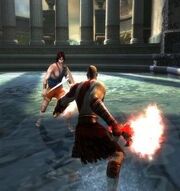
Kratos fighting Perseus.
Soon afterwards, Kratos encountered his half-brother Perseus, who was on a quest to save his beloved Andromeda from Hades. Perseus challenged the Ghost of Sparta to a fight, believing it would prove his worth to the Sisters of Fate and allow him to rescue Andromeda; or, if not that, would at least allow him to "bathe in the glory of being the one to bring down the mighty Kratos". However, Perseus was no match for Kratos, who made short work of the legendary Greek hero by breaking all of his equipment and impaling him on a large hook. Kratos then took hisshield and used it to enter the Courtyard of Atropos. Reaching the Great Chasm, he was confronted by an elderly Icarus, who had by this point lost his sanity.
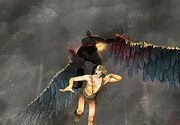
Kratos rips off Icarus' Wings.
Icarus tries to get Kratos to stop his quest, rambling on about how it is "MY TEST!!!" while telling him that he would never make it across the chasm. Annoyed, Kratos tries to push him aside, but this does not deter Icarus. He continues to get in Kratos' way and yell about the futility of his quest, telling the Ghost of Sparta that "THIS IS MY TEST" and that only he can fly across the chasm and receive an audience with theSisters of Fate. Kratos takes hold of his throat and declares "I will make it to the Sisters of Fate and I will use your wings to do so." Icarus tackles Kratos, causing them both to fall off the ledge and plummet to Underworld. Their fight continued as they fell, but ended when Kratos ripped off Icarus' Wings and drop-kicked him down in the Underworld, sealing his fate. However, Kratos managed to fly to safety by landing on Atlas.
Gaia then told him that he needed to return to the surface, prompting Kratos to travel across Atlas' body and destroy part of his chains. This relieved some of the Titan's burden, but called attention to Kratos' presence. He scolded Kratos for having the nerve to show his face to him again, after what he had done. Intent on crushing the former God for his imprisonment, Atlas ultimately ceased his attempt to kill Kratos when he revealed that he was now an enemy of Zeus, and sought to change his fate in order to destroy the King of the Gods. Atlas told Kratos more about the Great War and how it ended when Zeus created the Blade of Olympus. Atlas gave Kratos some of his power and lifted him back to the surface, where he continued his journey into the Palace of Fates.
There, he took two scholars hostage and forced them to read an incantation that Kratos himself could not read before ultimately sacrificing them both. Soon afterwards, he encountered the last remaining Spartan warrior, only this time shrouded in darkness. With neither of them aware of who they were facing, both warriors engaged in battle, intending to reaching the Sisters themselves.
Eventually, the Last Spartan fell prey to Kratos' Blades as they tumbled out of the stained glass window into the light, revealing their identities to each other. The Spartan warrior informed Kratos of the fact that Zeus had destroyed Sparta before succumbing to his wounds, causing Kratos to be overtaken with anger and shout to the Heavens. Blinded by rage, he was then attacked by the Kraken, providing little resistance as it proceeded to strangle him. Held firm in its grasp, Kratos then saw an astral projection of his wife, which was actually Gaia in disguise, encouraging him to go on and telling him that Hades will torment him for all eternity if he dies. She told Kratos that the Titans wanted him to lead them into battle before empowering him with the Rage of the Titans. Kratos, ultimately regaining his will to live, engaged the Kraken in battle and killed it. Then, using the Phoenix, he made his way to the Sister's main stronghold.
Kratos entered the Sister's throne room and met with Lahkesis, who told him that the Fates decided upon the destinies of all, and how it was she who allowed him to come as far as he did. She then proclaimed that it was not his destiny to kill Zeus. By this point, Kratos had no interest in negotiation, telling her that they no longer had any control over his destiny, ultimately threatening to kill her if she did not let him pass. This enraged Lakhesis, who then engaged the Ghost of Sparta in battle. Kratos almost immediately gained the upper hand and inflicted heavy damage on Lakhesis, infuriating her even further. She summoned her sister Atropos, who took Kratos back in time to his battle with Ares, attempting to destroy the Blade of the Gods so that his past and present self would cease to exist. Kratos subdued her before teleporting himself back to the present. Lakhesis grew ever more frustrated and engaged once more, only now with Atropos in tow. After a long and hard battle, he trapped them in both a time void and shattered it, erasing them for good. Kratos then proceeded on to Clotho, who implored him not to go forward with his manipulation of fate. Kratos, having pinned all of Clotho's lower body parts to the ground, ascended to the top platform and impaled her with one of her own instruments, instantly killing her. Kratos then took control of his own life thread in the Loom Chamber, proceeding back in time to the point where Zeus betrayed him.
Once there, Kratos immediately charged at Zeus and tackled him. Shocked by Kratos' sudden reappearance, Zeus assumed that the Sisters of Fate had helped him somehow But as Kratos pulled the Blade of Olympus out of his past self, he informed Zeus that all three Sisters are dead. Zeus then commented that he had underestimated Kratos, but that he would not do so again. Both men charged at each other, engaging in a vicious battle through the skies before landing on the Summit of Sacrifice, where Zeus soon reappeared in his full God form. Zeus summoned an army of sirens to aid him while hurling lightning bolts at Kratos, only for the Ghost of Sparta to use the sirens to paralyze Zeus and plunge the Blade of Olympus into his oversized hand. Infuriated, Zeus elected to shrink back down to mortal size and engage Kratos directly. The God eventually manages to take the Blade away from Kratos, only to lose it once more as Kratos drives the blade into Zeus' abdomen and throws him against a nearby set of standing rocks. Zeus soon manages to swipe the Blade of Olympus out of Kratos' hands a second time, but loses it again when Kratos impales Zeus with the blade and throws him against another set of standing rocks. The Ghost of Sparta then ascends the structure and drops the top slab onto Zeus, greatly infuriating the God. Zeus, having had enough, reverts to his full Olympian size and unleashes a powerful lightning storm on Kratos. Yielding defeat, Kratos put down the Blade of Olympus and asked the King of Gods to release him from his torment, to which Zeus responded: "I will release you from your life, my son, but your torment is just beginning" before moving in to kill the Spartan.
However, this is revealed to have been a trick by Kratos, who then deflected the blow, slammed Zeus' head against a nearby rock before pinning Zeus down with his Blades. Taking the Blade of Olympus back, Kratos furiously drove it into Zeus' abdomen, intending to kill Zeus in the same way he had killed Kratos in Rhodes. Athena appeared moments later and charged at Kratos, begging him to stop. Zeus then took advantage of the situation and tried to flee, but this did not escape Kratos' notice. The enraged Spartan made one final attempt on his life, only for Athena to jump in the way and take the blow herself. A distraught Kratos asked Athena why she sacrificed herself, to which she replied: "to save Olympus". She further revealed to Kratos that Zeus is his father and that his actions were driven by fear. Zeus' intention was to finally break the cycle of patricide by killing Kratos, whom he now recognized as the "Marked Warrior" destined to bring about the final destruction of Olympus.
Athena begged Kratos to forfeit his quest for revenge, warning him that all of Olympus would unite against him and that should he succeed in killing Zeus, the world would be destroyed. By this point, Kratos' sanity and compassion for others had been completely drained, and he vowed to destroy all of the Gods along with anyone else who stood in his way. Traveling back in time to the Titanomachy, he brought the Titans with him to the present and led them forth to Mount Olympus to confront the Gods one last time. Meanwhile, a badly weakened Zeus calls forth a meeting of the Gods (although only Poseidon, Hades, Hermes, and Helios are present), urging them to put aside their differences and unite against their common enemy, Kratos. Moments later, Mount Olympus begins to tremble as the Gods look down in horror at the ascending Titans, who are now accompanied by Kratos. The Ghost of Sparta yells out to his father, declaring that the reign of the Olympians is now over.
The Second Great War
- See: God of War III
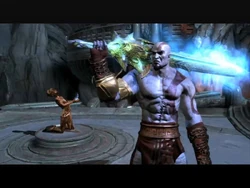
| “ | Zeus! Your son has returned, I bring the destruction of Olympus!!! | ” |
–Kratos | ||
Zeus immediately ordered his fellow Olympians, along with his demigod son Hercules, to attack Kratos and his Titan allies, although Zeus himself opted to stay out of the fray for the time being as he was still recovering from his last battle with Kratos. The Olympians initially had the upper hand, however, as Hades successfully dislodged several Titans with his claws, while Poseidon shot down from Olympus like a torpedo and struck a death blow through Epimetheus' chest, sending the Titan to his grave. Moments later, Poseidon resurfaced within a colossal watery construct in his image, spawning several Hippocampi to aid him in battle. With Poseidon as their greatest threat, having already decimated numerous Titans and now going after Gaia herself, Kratos engaged the God of the Sea in a vicious battle. Kratos freed Gaia from Poseidon's Hippocampi, allowing her to grab the Sea God and slam him into the mountain. With Poseidon pinned down, Kratos moved in to attack. The enraged Spartan pounded Poseidon with his blades, while the God tried to defend himself with his trident. Eventually, Kratos shattered the massive rock formation on Poseidon's chest, exposing his weak spot.
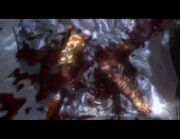
Kratos kills Poseidon.
Poseidon broke free of Gaia's grasp by attacking her with more Hippocampi. However, the Spartan quickly broke Poseidon's hold over Gaia, allowing her to throw a devastating punch which sent Kratos on a collision course with the Sea God, knocking him out of his water form and onto a nearby cliff. Kratos grabbed Poseidon and threw him against the rocks, watching as his water construct disintegrated and collapsed into the sea. As the Ghost of Sparta moved in to finish him off, Poseidon told Kratos that no matter how many gods fall, there would always be another to stand against him. Unfazed, Kratos retorted that any god who gets in his way will meet the same fate. Poseidon, realizing just how insane and vengeful Kratos has become, warned him to relent, stating that the death of Olympus would mean the end of the world. Kratos, again, is unfazed, and coldly responds: "Then prepare for YOUR death, Poseidon". Kratos then grabbed the Sea God by his neck and battered him uncontrollably, slamming his uncle's head against the rocks before throwing him against a large boulder. In desperation, a visibly terrified Poseidon attempted to crawl away and escape back into the sea, but Kratos easily caught up with him, gouged his eyes out, and snapped his neck before tossing his corpse off the mountain. With Poseidon's death, the seas unleashed a cataclysmic flood that engulfed the entire world, drowning almost all of mankind save for those on Olympia and other mountaintop locations.
The Spartan climbed back onto Gaia's hand and they both continued onward to Zeus' pavilion, where the King of the Gods angrily anticipated Kratos' arrival. Gaia wrapped her palm around Zeus' platform, trapping him there as an eager Kratos jumped down from Gaia's hand to confront Zeus. The enraged Spartan taunted the King of the Gods, reminding him that with Athena's death, there was no one left to protect him. In response, Zeus told Kratos that Athena died because of his blind rage, asking him how far he was willing to go to sate his need for vengeance. Kratos then boasted that neither the Sisters of Fate nor the gates of Hades could stop him, ultimately declaring that Zeus would not live to see the next sunrise. As Kratos and Gaia prepared to attack, Zeus summoned a massive bolt of lightning which he used to knock both Kratos and Gaia off of the mountain, in the hopes they would fall into the River Styx below. The resulting blast tore off a portion of Gaia's arm, causing her to struggle to maintain her grip. Kratos urged Gaia to help him as he too was losing his grip, but the Titan refused, claiming that doing so would cause both of them to fall off the mountain. Kratos reminded her of why she saved him from death, to which Gaia replied that he was nothing more than a pawn whom they no longer needed, as the Titans had finally reached Zeus. Betrayed yet again, Kratos plummeted from the mountain and found himself stranded in the Underworld once more. Contemplating his life as he lurched through the River Styx and its caverns, he resolved to escape Hades and destroy Zeus once and for all. After being drained of nearly all of his power by the dead souls of the River Styx, he met the ghost of Athena, who claimed to have reached a "higher existence" and offered to help Kratos exact his revenge on Zeus. Suspicious of this turn of events, Kratos demanded to know why she had such a sudden change of heart as she died protecting Zeus. Athena then explained to Kratos how she saw truths where she did not before, and to regain his trust, she transformed Kratos' ruined blades into the Blades of Exile, which would help him survive the Underworld and the foes that awaited him. She then instructs him to find and extinguish the Flame of Olympus, claiming that it is the source of Zeus' power.
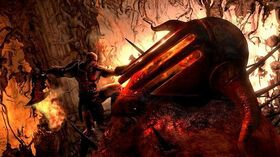
Kratos battling Hades
Kratos made his way through the Underworld, meeting lost souls, stealing Apollo's bow from Peirithous by burning him alive, and encountering The Judges, who decided that Kratos was not yet ready for the afterlife before urging him to proceed forward. Along the way, he would encounter a statue of Pandora, which called out to Kratos. Initially mistaking its voice for Calliope's, he soon realized that it was someone else and tried to walk away. Before he could, the voice claimed to know all about Kratos, telling him that everybody on Olympus was terrified of him, to which Kratos replied: "there are reasons for that". Pandora tried to tell him more, but she was interrupted by the voice of Hades, who mocked Kratos. The Spartan ordered Hades to reveal himself, only for the God of the Underworld to reply that Kratos was too impatient and that soon enough, they would have their time to play. Descending deeper into the depths of the Underworld, he encountered a despairing Hephaestus, the Craftsman of Olympus as well as the God of Volcanoes and Fire, who blamed Kratos for his exile to the Underworld as well as the disappearance of his daughter Pandora. Despite his grievances, however, Hephaestus was passive and did not attack Kratos, even offering him helpful information about the secrets of Olympus, his adopted daughter Pandora, and Zeus. Progressing further into Hades' kingdom, Kratos occasionally found mysterious notes that he silently acknowledged as being from various people in his past. He eventually found and entered Hades' Palace, using the coffin-wed body of Persephone that Hades had restored to open a pathway into a dark room where he would encounter the Lord of the Underworld himself. Once there, Hades recounted his grievances against the Ghost of Sparta, blaming him for the deaths of Athena, Poseidon, and especially his beloved queen Persephone (seemingly unaware of or indifferent to her hatred for him, and her plot to destroy the world) before telling the Spartan that he would make him suffer for all of the pain he has caused him. Emerging from the darkness, Hades tried to rip Kratos' soul out of his body and absorb it, but was unsuccessful. As the room lit up, Kratos immediately engaged the God of the Underworld, viciously tearing off and destroying chunks of his flesh before he could reacquire them and heal himself. As the battle wore on, Kratos used his blades to carve up Hades' neck in an attempt to remove his helmet, which only enraged the Underworld God further. Hades responded by tearing open a crevice in the ground, hoping to pull Kratos into the River Styx. However, Kratos intercepted Hades' claw with one of his blades, ensnaring the two weapons together and initiating a tug of war. With his other blade still free, Kratos continued to fend off Hades' attacks and damage him even more as the enraged god promised Kratos that his death would only be the beginning of his suffering. The Ghost of Sparta continued to have the upper hand, damaging Hades to the point where he could easily fire his other blade and use it to form a noose around Hades' neck. Kratos proceeded to slam his uncle's head into the roof until his helmet was finally dislodged, robbing him of his Claws and causing him to plummet into the River Styx in the process.
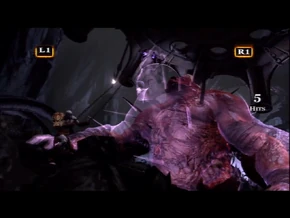
Kratos stealing Hades' soul.
The Underworld God was not finished, however, drastically increasing his size and emerging from the River Styx in a last ditch effort to destroy his enemy once and for all. Using Hades' own claws against him, Kratos further weakened the God of the Underworld and attached the claws to his now exposed, damaged skull, ripping the soul right out of his body, killing him. Hades' death caused all of the souls in the Underworld to run rampant, tearing a giant hole in his abdomen which Kratos used to escape the area. Now in possession of Hades' soul, Kratos gained the ability to swim through the River Styx unharmed and use the Hyperion Gate at will.
Kratos once again emerged in Hephaestus' lair. The Smith God then asked Kratos if Hades was truly dead, to which Kratos responded in the affirmative. Hephaestus laughed in approval, claiming that Hades deserved to suffer but thought his death was impossible. Imparting more information to the Ghost of Sparta, Kratos bade farewell to Hephaestus and used a Hyperion Gate to escape from the Underworld.
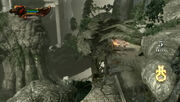
In retribution for her betrayal, Kratos sends Gaia plummeting from Olympus.
Back on Mount Olympus, on the outskirts of the city of Olympia, Helios rode by on his chariot and threw some fireballs at Kratos, prompting him to give chase. In the process, he encountered a struggling Gaia, who was amazed by his survival and asked Kratos to help her. Remembering Gaia's earlier betrayal, he adamantly refused to help her, instead severing her arm as she desperately asked Kratos if she meant nothing to him. The Ghost of Sparta retorted in a show of cruel irony it was, in fact, Gaia who was the pawn, his pawn while telling a pleading Gaia that the war against Zeus was "his war" and not hers. Kratos then destroyed the root of Gaia's hand with the Blade of Olympus, sending a screaming Gaia plummeting to her presumed death. Later, he finds Helios engaged in a battle with the Titan Perses. Using a nearby catapult, he knocked the Sun God into Perses' grasp. The Titan then crushed him in his hand and threw him across the city. The Spartan proceeded to hunt Helios down and finish him off.
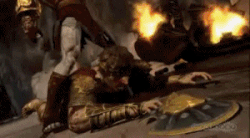
Kratos kills Helios.
He eventually found Helios, but the badly injured Sun God summoned a phalanx of shield-carrying soldiers to shelter him from Kratos' onslaught. The Spartan took control of a nearby Cyclops and used it to eliminate the phalanx completely. With no other options left, Helios tried to trick Kratos into sparing his life with a promise that he would repay him in full. Although suspicious, Kratos considered the offer and asked Helios where he could find the Flame of Olympus. Helios refused to provide a straight answer, instead warning him of the futility of his quest, to which Kratos responds "of all the lives you should worry about Helios, mine is not one of them". With his guard lowered, Helios attempted to blind Kratos with a beam of sunlight. Although this momentarily stunned him, Kratos blocked out the sunlight long enough to make his way back to Helios and begin stomping his head. The Sun God soon relented and told Kratos that in order to receive the Flame's power, he must step into the Flame itself. However, Kratos immediately knew that this was a lie, as Hephaestus had already told him that the Flame is lethal to both mortals and Gods alike. Helios tries in vain to dissuade Kratos from believing the Smith God, calling him a "freak that has fallen from the graces of Olympus", but Kratos responds that this is exactly why he believed the Smith God in the first place. Having run out of options, Helios resigned himself to his fate, although he remained defiant to the end, telling the Spartan that his death would not lead him to Zeus, to which Kratos disagrees.
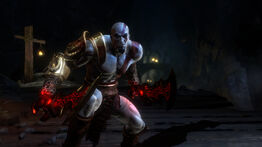
Kratos in Olympia.
The Spartan then grabbed the Sun God and pulled his head off with his bare hands, causing the sun to be permanently veiled by dark clouds and rain storms. Although Helios was now dead, his head could still emit intense sunlight, and Kratos used it as a lantern to light his way through the dark caverns of Mount Olympus. Perses attacked the Spartan on his way up the mountain (presumably to avenge Gaia), forcing Kratos to kill him. As Kratos reached the Labyrinth, he was confronted by Hermes, who joyously teased and mocked the Spartan warrior both for his past failures and the foolishness of his current vendetta against Zeus. Kratos attempted to ignore Hermes at first, believing him to be nothing more than a "fly from the ass of Zeus", but Hermes continued to provoke him, stating that the only reason he doesn't provide chase is because he knows he will never catch him, before speeding his way up the Chain of Balance away from Kratos. The Ghost of Sparta slowly ascended the Chain of Balance until he reached a chamber containing Pandora's Box. Surprised to see the box, Athena soon appeared and told him that there is a dormant, unused power inside that he will need to defeat Zeus, although the box was inaccessible due to it being sealed off and engulfed by the Flame of Olympus. Athena further explained that in order to quell the Flame, he would need the box's namesake, Pandora herself. Hermes reappeared the moment Athena departed, and provoked Kratos into chasing him. Along the way, Hermes childishly mocked and belittled Kratos for his lack of speed and his perceived stupidity. Although he was reasonably successful in providing chase, Hermes soon found a narrow chain leading to the head of a large statue which Kratos could reach. Hermes sped across the large chasm and made his way to the top of the statue, telling Kratos to "keep up". Greatly underestimating the mortal, Hermes was soon knocked from his perch and severely weakened after Kratos used a nearby catapult to destroy the statue. He also used his blades to attach himself to the catapult fodder, using it to close in on Hermes.
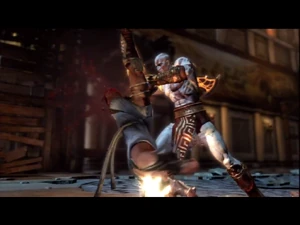
Kratos killing Hermes.
After the statue collapsed, Kratos noticed a leftover blood trail and used it to corner a now defenseless Hermes. The Spartan made short work of the Speed God, who then bitterly insulted him for his lack of honor and the terrible things he has done. Kratos then grabbed Hermes and sliced off one of his legs, watching as the humiliated God attempted to squirm away before slowly approaching him and brutally cutting off his half-brother's other leg. The loss of both of Hermes' legs resulted in his death, and caused a deadly plague to spread across the land, affecting all human, animal, and plant life. Kratos took Hermes' boots, using them to traverse wide chasms and proceed further into the halls of Olympus.

Kratos kills Hercules.
Eventually arriving in an empty forum, Kratos encountered a drunken Hera, who ordered his half-brother Hercules to destroy him as she watched from above. Hercules expressed resentment towards Kratos, claiming that Zeus had always favored him before stating his desire to kill Kratos (calling it his 13th and final labor) and claim the God of War throne for himself. Kratos told Hercules that his aspirations are a waste of time since the reign of Olympus is coming to an end. Hercules replied "we will see about that" before ordering his legions to attack Kratos. Easily besting his undead warriors, Hercules himself joined the fray, using the Cestus he acquired from his conquest of the Nemean Lion to fight Kratos while ordering his legions to swarm him, allowing Hercules a clean hit. After a long and brutal fight, Kratos grabbed Hercules and carried him to the beds of spikes lining the forum walls, throwing him into them and tearing off all of his armor. This only served to provoke Hercules, who then killed all of his legions with an earthquake punch and engaged Kratos one on one. As the fight went on, Hercules grew increasingly impatient and clanged both of his Cestus together, temporarily stunning Kratos. Hercules took this opportunity to brag to Hera about his impending victory, only for Kratos to attack him from behind and take Cestus away from him. Now with no weapons, Hercules tried to best his half-brother using his bare hands and legendary strength, hurling portions of the forum wall at Kratos and eventually lifting the floor out from underneath him in the hopes of causing the Ghost of Sparta to fall to his death. Kratos used the Cestus to climb back up onto the platform before punching it back down on top of Hercules, trapping him underneath. Kratos proceeded to beat his half-brother to death with the Cestus, mutilating and completely destroying his face until the floor beneath them broke, causing them both to plummet to the sewers underground.
Later, he encountered a radiant Aphrodite and her handmaidens in the goddess' chamber. Aphrodite did not seem to care about Kratos' war on Olympus and asked the Spartan to have sex with her. After some initial hesitation, Kratos indulged Aphrodite before using the nearby Hyperion Gate to visit Hephaestus, who sarcastically asked Kratos if his wife "had conquered another God of War". Kratos did not answer his question, telling him that it is a matter between Hephaestus and his wife, before questioning the Smith God on the whereabouts of Pandora. Hephaestus, knowing full well what Kratos intends to do with Pandora, demanded that he stay away from her, telling him that it's his fault that she is imprisoned in the Labyrinth and the reason that Hephaestus was exiled to Hades. Kratos insists that he has never wronged Hephaestus, but the Smith God tells him that by opening Pandora's box in his quest to destroy Ares, Zeus became infected with Fear and surmised that Hephaestus was hiding something from him. Zeus tortured the Smith God until he confessed to the creation of Pandora, a key to the box which had taken on a life of its own, with Hephaestus loving her as if she was his own daughter. Zeus took Pandora away from him and banished Hephaestus to Hades. Seemingly unmoved, Kratos insisted that he will stop at nothing to obtain his revenge. Hephaestus then decided that the only way to stop Kratos would be to send him on a suicide mission. To this end, he asked Kratos to retrieve the Omphalos stone (unbeknownst to Kratos, it was contained in the belly of the Titan Cronos), promising to make him a special weapon with it.
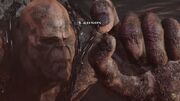
Kratos encounters and battles Cronos.
Having journeyed through Tartarus, he found the severed hand of Gaia resting in the palm of Cronos, who immediately accused Kratos of murdering Gaia. Blaming him for the torment he now suffers in Tartarus (Zeus banished Cronos there after Kratos conquered the Temple of Pandora), Cronos attempted to kill the Ghost of Sparta. Initially attempting to crush Kratos between his fingers, the Spartan used Helios' head to temporarily blind Cronos and escape death. Landing on Cronos' arm, he went unnoticed by the Titan until he scaled his arm and destroys a massive pimple. Cronos made several more attempts to flatten Kratos with his hand, only to have one of his fingernails dislodged, causing great pain to the Titan. After scaling Cronos' hand, Kratos once again blinded the Titan before making his way to the belt that kept Pandora's Temple chained to his back. Kratos opened the belt and attempted to remove the crystal nail holding Pandora's Temple in place before Cronos grabbed him and attempted to smash Kratos between his palms. Kratos survived, however, by plunging the Blade of Olympus into one of his palms, eventually making his way to Cronos' shoulder joint. After using a skinless Cyclops to damage Cronos further, the Titan decided to eat Kratos, who then took the Omphalos stone from his stomach and used the Blade of Olympus to escape, spilling the Titan's entrails in the process. Cronos begged the Spartan to leave, as he now had what he came for.
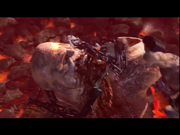
Cronos' death by the hands of Kratos.
However, Kratos ignored his pleas and once again made his way to Cronos' belt, dislodging the nail and driving it into Cronos' chin. Now in tremendous pain, Cronos called Kratos a "coward" who "murders his own kin". Kratos then stabbed his grandfather in the forehead with a completely charged Blade of Olympus, killing him.
The corpse of Cronos collapsed just above Hephaestus' lair, and Kratos angrily accused the Smith God of sending him on a suicide mission. Hephaestus pleaded innocence, claiming that he knew Kratos could handle himself, before taking the Omphalos stone and forging the Nemesis Whip. Hephaestus then tried to electrocute Kratos with his Ring in a final attempt to kill him, shouting "Here is your retribution!". Kratos managed to shake off the effect and kill Hephaestus by impaling him on his own anvil. In his dying words, the Smith God begged Kratos to spare his daughter, as well as begging for Pandora's forgiveness, after which he passed away. However, Kratos appeared to bear no ill will towards Hephaestus as he knew the sentiment behind his betrayal, as he later told Pandora that Hephaestus had done what any father should: protecting the life of his child.
Using the Nemesis Whip to make his way through the Gardens of Olympus, he encountered a depressed and drunken Hera once more. Blaming Kratos for the deterioration of her garden along with all other forms of life on Earth, she ineffectually struck him but was easily pushed aside. She then taunted Kratos by telling him that his simple mind would never find a way out of the garden, although he eventually did. Deeper into the garden, Kratos encountered Hera one more time, and she continued to express her hatred for him because of what he was doing to the planet. Kratos tried to ignore her and continue on until she called Pandora a "little whore", causing him to choke her and brutally snap Hera's neck. Her death caused all plant life to wither and die.
Kratos returned to the Labyrinth and met an imprisoned Daedalus, who was the Labyrinth's main architect. Zeus promised him that he would have his son Icarus back once he completed the Labyrinth, but instead imprisoned him in one of the Labyrinth's traps. Nevertheless, Daedalus continued to delude himself into believing that Icarus was still alive and that Zeus would come through. His hopes were ultimately crushed when Kratos revealed that Icarus was dead (although the Spartan neglected to mention that he was the one who killed him by ripping off his wings and allowing him to fall into Hades), causing Daedalus to sob uncontrollably. Soon afterwards, and despite Daedalus' pleas, Kratos pulled a lever in order to progress, ultimately setting off a trap that killed the poor inventor. Moments later, he rescued Pandora from the Labyrinth and took her with him. Initially believing her to be nothing more than an object, she reminded Kratos so much of his daughter that he grew to care for her as his own child. With Pandora in his possession, he had one final task ahead of him: neutralize the Three Judges. To this end, he travels back to the (now completely abandoned) Underworld and severed the Chain of Balance, destroying the Three Judges in the process. Making his way back up to the Flame's chamber, he raised the Labyrinth so that Pandora's box could be accessed. At this point, Kratos began to have second thoughts and refused to let Pandora sacrifice her life. Pandora resisted, telling Kratos that she did not want to be treated as a child and that she needed to embrace her destiny, only to be interrupted and apprehended by Zeus himself.
Kratos ordered Zeus to let go of Pandora, only for the King of the Gods to refuse and berate him over his apparent obsession with Pandora, referring to her as an "object". Zeus told Kratos that he should not confuse Pandora with his own flesh, and blood, but mused that he already had. He cited the destruction of Olympus and the world as proof of Kratos' need for atonement before expressing absolute horror at his son's actions, telling him to look around at what he has done. Kratos, in turn, snarled that he only saw what he had come to destroy. Zeus then expressed regret over taking pity on Kratos, calling it the "greatest mistake" he had ever made, before telling Kratos that taking pity on Pandora would be his greatest mistake. Kratos angrily insisted that it had nothing to do with her, with Zeus replying that it had everything to do with her. The increasingly agitated Spartan once again ordered Zeus to put her down, to which he responds by callously tossing her aside. Father and son engaged in battle once more as Olympus continued to crumble around them. Meanwhile, Pandora tried to run into the Flame, intent on pacifying it, although Kratos attempted to stop her. However, Zeus inadvertently provoked Kratos into letting her go by stating that he should not fail her like he failed his family, causing Kratos to attack Zeus in a fit of extreme rage.
Kratos then opened the Box once again, only to discover that it was empty. Zeus then mocked him for "another stunning failure" and went outside to recover, while Kratos' fury boiled even further. Outside, father and son met again on the pavilion. Zeus, overlooking the destruction his son caused, mused that he would have a lot of work to do after defeating Kratos, who urged his father to face him in combat, stating "it is time to end this", to which Zeus agrees. But before either could claim victory, the platform suddenly began to tremble as a reawakened Gaia grabbed hold of the pavilion. Kratos expressed shock at her survival, only for Gaia to blame the Ghost of Sparta for the destruction of her planet (not realizing that Kratos and Gaia shared the same goal of destroying the gods, and that the destruction he caused would have happened anyway). She attempted to crush the pavilion between her hands, declaring that father and son would die together. Seeing no other exit, Zeus and Kratos were forced to enter the wound on Gaia's chest (still present from her battle with Poseidon) and dueled near Gaia's heart, sucking the life out of it. Kratos managed to kill both Zeus and Gaia by simultaneously impaling both with the Blade of Olympus.
Awakening amidst the cracked earth, Kratos tried to leave, but Zeus' still active spirit, consumed by some lasting hatred for his infidel son and empowered by Fear, attacked Kratos, draining him of his willpower and anger, and instead of filling him with fear and loss, bringing him to the verge of death. Trapped inside his own mind and tortured by his memories, Kratos was aided by the spirit of Pandora, who helped him abolish the various torments of his soul. With her help, Kratos finally forgave himself for killing his family and Athena before he dove into The Pool of Blood and confronted his inner demons in the form of his slain victims. Overcoming these hurdles with the power Hope, Kratos returned to the physical world and with a stronger resolve, he managed to free himself from Zeus' choking grip. He then furiously attacked Zeus' spirit, ultimately forcing it back into his own body, temporarily resurrecting a weakened Zeus.
Kratos then realized that Zeus was now so weak that he no longer needed the Blades to kill him. The Spartan cast his weapons aside and charged at Zeus, who attempted to hold Kratos back. However, he easily broke through Zeus' defenses and slammed him against a rock, causing black smoke (presumably Fear) to escape from Zeus' mouth. Kratos then furiously beat Zeus to death with his bare hands, thus finally fulfilling his goals of revenge and signifying the end of the Olympians' reign once and for all. The chains around Kratos' arms loosened as Zeus' body exploded, plunging the world into complete chaos. With the reign of Olympus now over, Kratos looked out over the horizon and finally came to realize just what he had done.
Arriving to congratulate Kratos, Athena asked him to turn over the power he claimed from Pandora's Box, stating that mankind was now ready to hear her message. Kratos responded that the world now stands in ruin, and therefore whatever message she has is now useless. Athena once again told him to give her what he found in Pandora's box, only for Kratos to tell her that the box was empty. However, Athena saw the power in his eyes and told him that she was the one who put the powers of Hope inside the box. Kratos reflected that Pandora had died in vain, only to serve his need for vengeance. He was consumed with grief over her death, as well as the death of the world around him.
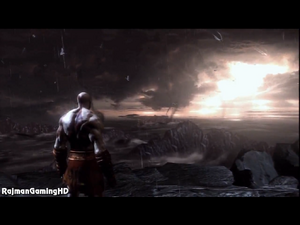
Kratos, overseeing the Chaos he had sent the world into
Athena ordered Kratos to return the power he had obtained, as she believed it rightfully belonged to her. For now that the world was cleansed by chaos, she would rebuild it under her rule, using the power of hope. She then quickly came to realize, however, that when Kratos first opened the box to kill Ares, the evils were released and infected the gods of Olympus, whereas she initially believed that all of the evils went into Kratos. As the evils took hold of the gods, the power of hope instead infused itself into Kratos. Buried underneath all of the years of guilt, anger, and need for revenge, Hope was finally released when Kratos learned to forgive his past deeds, thus releasing its power. Kratos, wracked with guilt over the world's destruction and realizing that he had nowhere else to go and nothing left to live for, committed suicide by impaling himself with the Blade of Olympus. As a result, the power of Hope was inadvertently released into the mortal world, angering Athena. The Goddess told him how disappointed she is, to which he merely responded with a tiny smirk and a faint laugh. She then pulled the Blade out of Kratos' body and disappeared, leaving a heavily breathing Kratos to die. The wounded Spartan then laid himself down, laughing softly as he lowered his head down the ground, and slept in a pool of his own blood, his breathing echoing throughout the end, seemingly ready in letting death grab his soul.
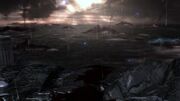
Kratos' ambiguous fate.
However, in a post-credits scene, the eagle-engraved mural where Kratos died is shown deserted, with a trail of blood leading off the cliff. The Ghost of Sparta, having somehow survived, discovered that he is cursed to walk the Earth forever as punishment for his terrible deeds. Seeing no reason to remain in Greece, he picked up his lost Blades of Chaos and traveled north, hoping to leave the wreckage of his past behind him.
God of War (2018)
Kratos in the E3 2016 trailer
Several centuries after the destruction of Olympus, Kratos lives a secluded life in a remote forest of Norway, the realm of the Norse gods. Although the circumstances behind the rebirth of the world are still unexplained, it is assumed that the power of hope Kratos unleashed allowed it to recover and start anew. He eventually met Faye, his future second wife, while trying to retrieve the Leviathan Axe in a nearby forest. They soon gave birth to a son named Atreus, although Faye initially wanted to name him Loki. The boy was raised mainly by Faye, who taught him how to hunt and how to read the Nordic language, among other things. Per Faye's request, Kratos never took Atreus hunting with him and instead hunted for the family by himself. This led to him being absent for most of Atreus' life.
A couple of years later, Faye died for unexplained reasons and requested that her family take her cremated ashes to the highest peak in the Nordic Realm. She also wished that Kratos would take her place in raising their son, although he did not believe he could do it without her. Before their journey began, Kratos cut down all of the trees around their home that were marked with Faye's yellow hand print which had, unbeknownst to Kratos, sheltered them from the wrath of the Norse gods. This was for Atreus to venture into dangerous land of the Norse gods with his father's support. Kratos wanted to be sure that his son was ready for the long adventure waiting for them, so he tested him in hunting a deer. With a few mistakes, Atreus did manage to prove himself, but they were intercepted by an aggressive troll. While the two survived the attack, Atreus would show his aggressive tendencies by continuing to stab the already dead troll, with Kratos determining him not to be ready.
As they went back to their house, a stranger suddenly knocked on their door, demanding that Kratos show himself. The strange man would then demand him for answers, while taunting him of his past, something he did not anticipate. The argument would then spawn an aggressive fight, with the stranger showing unexpected great power. But Kratos would be the supposed victor when he snapped the man's neck after an exhausting battle.
Knowing that the dangers of the outside world will inevitably come, Kratos changed his mind and he and Atreus began their journey.
During their trip to the highest mountain, they met a dwarf named Brok, who mentions that he and his brother are the forgers of the axe that Kratos possesses. The two would then meet the other brother, Sindri, a bit later, who was disheartened about Faye's death.
Atreus found tracks of a boar, deciding to hunt again. When he did wound the creature, the boy chased after it. Kratos and Atreus would then travel into another realm in the process, where they found the boar heavily injured and under the care of a mysterious woman. The woman, going by the Witch, brought them back to her home to heal the boar. While she sent Atreus to gather some supplies, she told Kratos in secret about his godly heritage, knowing that his son is unaware of his father's and his own true nature. And she warns the former god the danger he has put the two in as the Norse gods will be very hostile towards them as a result. The Witch proceeded to open a portal leading them to their destination, wishing them luck on the way out.
As they made their way to the Lake of Nine, they found a rune saying, "Sacrifice your arms to the centre of the water, awaken again the cradle of the world". Kratos decided to the throw his Leviathan Axe to the lake as it said. While it initially did nothing, the lake would soon create heavy drifts and waves. There the two encountered Jörmungandr, the World Serpent. As the serpent begins to slumber again, Kratos and Atreus realize that its awakening had dropped the lake's water, bringing them closer towards more concise destinations.
They find a large mechanism with a bridge attached to it named Tyr's Temple and decided to look around, also finding Brok again, who happens to set up shop in the massive area.
Exploring once more, they meet Sindri, Brok's brother and owner of the other half of the two's brand, who was curious as to why Kratos is in possession of the Leviathan Axe as it was created specifically for Faye. Atreus explains how the mother had already passed away and decides to help the two in creating improvements to their armor and weaponry.
They travel closer to the peak of the mountain afterwards, albeit while intercepting some enemies like an Ogre. Kratos and Atreus find themselves halted when there appears to be Black Breath blocking their way up the mountain. The Witch unexpectedly shows up in front of the two again, explaining how the only way to cast it away is by using the Light of Alfheim. She then takes them back to Tyr's Temple, commanding Kratos to have the contraption functioning again. There she takes them to the Realm Travel Room, the only place in all the nine realms one can use to travel between said realms. Using a Bifrost, they move the temple's bridge platform to the Alfheim gate, transporting them to Alfheim.
As they arrive, the Witch for reasons unknown seems to have herself being pulled out of the realm, but not before telling Kratos to use the Bifrost to obtain the Light. Continuing on, Atreus notices how the realm is in constant warfare between the Dark Elves and the Light Elves.
Weapons & Powers
As a demigod, Kratos possesses incredible superhuman strength, endurance and durability beyond that of any mortal or beast, the exact limits of which are yet to be determined. His strength is seemingly unaffected by his age, as despite being now elderly in the Nordic realm he was able to snap the neck of a troll with his bare hands, lift, throw and even smash massive boulders, and fight other beings with godly strength (such as the god Baldur) on equal footing. His strength seems to fluctuate depending on the situation. He can subdue many large and powerful beasts and is capable of overpowering the Hydra, throwing the Colossus of Rhodes after it attempted to crush him beneath its foot, and preventing both Cronos and Atlas from crushing him. His spartan rage increases his strength to the point where he can create earthquakes with a single stomp. Feats of durability include falling from great heights and walking away unharmed, getting crushed, stabbed, beaten, blasted, and burned by various enemies and traps as well as survive extreme environments such as Hel, the Norse Realm of the Dead, which according to Mimir was said to be so cold that not even Odin himself can survive there for long. Kratos also has useful skills that include climbing mountains and building, jumping great heights, and swinging on ropes to cross long gaps.
In his battle against Hercules, who is considered to be unrivaled in terms of sheer strength, Kratos proved capable of stopping his charges, forcing him backwards and enduring his powerful bear hugs without any ill effects, even breaking free from them and defeating him. Kratos also possessed the power to kill immortal gods. When Kratos loses in battle or war and is killed, he simply escapes the Underworld to Earth. Kratos can change his fate by manipulating or traveling in time.
Kratos has shown being able to rip off Helios' head, and rip creatures such as Undead Legionnaires, infected humans, monsters, and magical beings in half, using only his bare hands. It is presumed Kratos was born with his god-like strength and abilities due to being Zeus' demigod son. He might also be partially immortal and may have gotten stronger when he absorbed powers from the Gods. After Kratos killed Ares, Athena made him the new God of War, giving him the powers of a God. Kratos could grow 500 or more feet tall, as well as become a fiery comet which would lay waste to all below him, and possessed all powers of a God of War. It is possible he had acquired a permanent level of power and ability beyond even that of demigod from his constant trials and contact with different powers and magic.
In addition to his vast physical strength, Kratos also possesses superhuman agility, stamina, durability, endurance, reflexes, and speed. He is capable of sensing danger and possesses great skills and accuracy with all forms of weapon and powerful magic. Kratos can also keep up with opponents who possess vast speed, such as Zeus who has the speed of lighting, Charon, Hermes, and Pollux and Castor who possessed Chronokinesis. He is also able to regenerate from most wounds at a fast rate, though he did not regenerate from the scar on his stomach caused by the Blade of Olympus and the scar over his right eye caused by Ares for reasons unknown (maybe he cannot fully regenerate himself from scars caused by gods' power). Due to these abilities, Kratos is able to defeat monsters, magical beings, Titans and even the Gods themselves. Kratos also possesses powerful resistance to most forms of attack and magic (ex: time manipulation, illusion, and soul manipulation) that would easily kill most humans or magical beings.
Before serving Ares, Kratos' main weapon was his sword. Under Ares' rule, Kratos' main weapons became the Blades of Chaos, a gift from Ares as a sign of his servitude. They are essentially two Falchion-like blades on long chains, permanently fused and seared to the wielder's forearms. Once Kratos killed Ares, Athena replaced them with a nearly identical pair of blades called the Blades of Athena, and then replaces them again in God of War III with the very similar Blades of Exile. Kratos displays proficiency with all of his weapons. It is implied that he learned many of his fighting skills from Ares and other gods, the former God of War himself. Initially, Kratos also had a massive Spartan army under his command, used both before and during his servitude under Ares.
Kratos, before and after becoming a God, gained many powers and weapons from the Gods. When he relinquished his old powers to the Blade of Olympus, he was given new powers by the Titans. Some of these powers resemble the abilities given to him by the Gods. The Blade of Olympus is one of Kratos' greatest weapons, as he has infused all of his godly power into it.
Although often defined by his brute strength, he also has a wisdom almost matching the goddess Athena as he managed to solve many puzzles throughout his journey, many of them created by famous architects like Archimedes, Daedalus or Pathos Verdes III as such he not only survived all the traps and creatures within but he also become the only one to break those challenges. He also managed to solve the Olympus' Garden puzzle which even Hera had not believed he could. Interestingly enough, Kratos, when he had a godly power that can make him into a giant, such as when he fought in Rhodes, and similar to his empowerment against Ares, he seemed to prefer to use his normal mortal size to battle many powerful creatures and gods. Kratos also was wise enough to use the environment against his enemies, like using the bridge mechanic to kill a Kraken or using Gaia's heart to restore his health. The most notable event that proves his wisdom is when he manages to break out of Aegaeon the Hekantonkheires prison by using Megaera's anger toward him.
When he finds himself in the Nordic Realm, Kratos seems to have lost all the weapons he obtained from his quest of vengeance, having been destroyed by Zeus back when he was fighting him. But the Blades of Chaos are shown to still be in his possession, but decides to hide them under his cabin. This probably acts a way for him to move on while still reminding himself of the atrocities he committed. He initially wields a magic axe called Leviathan which he found in the woods where he met Faye, the mother of his future son, Atreus. The axe has the properties of ice magic as swinging its blade creates light blue energy waves, which can be charged up, and hitting the ground freezes enemies close to impact. Kratos also throws the axe directly towards opponents in battle and it seems that it can return to his hand by raising it but only for a limited range. While the Blades of Chaos, whom he unearthed to fight the forces in Helheim, possessed the properties of fire, which can also burn enemies in a certain heavy combo attack, the Leviathan's ice magic is very effective against enemies with the attribute of Burn, while the fiery swing of the Blades damage effectively those of Frost. After meeting with Brok and Sindri, gem slots called Runic Attacks are given on each weapon's head that modifies the axe's and the blades' abilities.
Kratos also wields the Guardian Shield, a golden circular shield attached to a golden gauntlet in his arm that he uses both offensively and defensively. He wears it like a brace for his left forearm but it instantly retracts to its full form at will. He is shown to pair this with his axe or his left Blade of Chaos in battle. He can infuse the magical abilities of his axe and the fire of his left Blade of Chaos into the shield, allowing for more explosive and devastating combos. And he is able to parry with the shield, managing to deflect enemy projectiles back at them.
Appearance
Kratos is the epitome of what a Spartan soldier is in that he is essentially made for battle. He is exceptionally tall, standing at a height between 6 and 7 feet, in which, due to his status a warrior, he is at his peak physical condition. Based on his facial features and voice patterns, one can assume Kratos' age is ranging from the late 30s to early 40s of the first games.
Prior to the series' actual time of taking place he had tanned skin and a red tattoo going down the majority of his upper body and up to his face. On his face, besides the aforementioned tattoo, he has a scar on his right eye and a black goatee. The scar was caused by Ares when Kratos was a child and tried to save his brother from the raid of Gods on Sparta. After killing his beloved wife and child, two of the few people he truly cared for, the village oracle bound their ashes to his skin to be forever a reminder of the horrible deed he committed on that day.
As a Spartan General prior to his service to Ares, Kratos wore Spartan hoplite armor and after becoming the new God of War he wore a very elaborately decorated piece of armor. By the end of God of War III, Kratos only wears a leather loincloth and armlets without the chains of the Blades of Exile.
As of God of War (2018), Kratos' appearance changes slightly. He appears older, with more wrinkles on his face looking to be in his mid to late 50s or 60s. His goatee has grown into a bushy, full beard which covers half his face and has several gray hairs. His skin is still pale and covered with the ashes of his Spartan family, and his tattoos have faded slightly. He retains the scar on his abdomen, however, it is larger and less jagged than before, (possibly due to him stabbing himself at the end of God of War III). Also present are faded scars from where the chains from the blades were attached to his forearms.
Kratos' Affixed Ashes
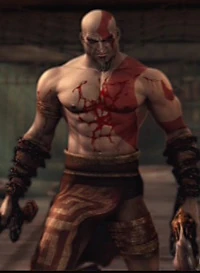
| “ | From this night forward, the mark of your terrible deed will be visible to all. The ashes of your wife and child will remain fastened to your skin, never to be removed. | ” |
As Kratos attacked a village which worshiped the goddess Athena at the behest of his lord at the time, Ares, the Oracle who resided in the village warned the Spartan to not enter the Temple of Athena. Kratos, however, disregarded her warnings and slaughtered the people in the temple. After the massacre, Kratos had realized that he had not only murdered all in the temple, but he had unintentionally murdered his wife and child. As Kratos mournfully cradled the unmoving body of his dead wife, he discovered that Ares had orchestrated his family's death. After leaving the burning temple, the Oracle placed a spell on Kratos, a spell which caused the ashes of his wife and child to be forever affixed to his skin. He keeps this appearance to his later life in Midgard, although some parts of his skin have pinked in color for some reason.
Only in God of War: Chains of Olympus is Kratos seen without the ashes, not including flashbacks and bonus costumes.
Personality
- Kratos: "By the Gods, what have I become?"
- Grave Digger: "Death. The destroyer...of worlds"
- ―Kratos and the Grave Digger.
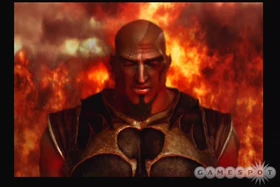
Kratos as the great Spartan general.
Throughout most of the series (particularly the later entries preceding his journey to Norway), Kratos is incredibly cruel, reckless, and destructive, willing to kill anyone who gets in his way, even innocent people. He is also shown to be incapable of accepting full responsibility for his actions, usually blaming the gods (especially Zeus, Ares, and Athena) for his suffering while ignoring or denying his own part in it. The memory of his misdeeds has driven Kratos to attempt suicide on at least two separate occasions.
Earlier on in the series canon, he is less callous towards the lives of others, albeit perfectly willing to sacrifice an innocent bystander when it is required of him. He also exhibits a deep sense of shame and horror at his reputation as the Ghost of Sparta. One example is when Kratos tries to convince a woman in Athens to give him a key, only for her to run away in terror and call him a monster; Kratos is visibly aghast by the fear and hatred others have for him. This shame was further demonstrated when he observed the massacres committed by Ares' minions, causing him to question what he had become. In God of War: Ascension, his earliest canonical appearance, he genuinely mourns the death of Orkos and the Delphic Oracle, even giving Orkos a decent funeral pyre. In Delphi, when Castor orders the guards to remove Kratos from the Oracle's temple, Kratos spares them when they have the good sense to flee. On the island of Delos, he is merciful enough to push an innocent man out of the way of an incoming spear, whereas he would have most likely just let him die in later games. It is possible that Kratos had yet to develop the apathy for others' lives that would come with his later experiences, but this is not proven. He is also very libidinous and sexually passionate with many women, although as stated by Gaia, he never found true happiness or comfort in these acts, with Lysandra being the only woman he ever loved.
Before and during the original God of War, Kratos was also respectful towards gods and divine entities (with the exception of Ares and Persephone), to the point of calling them "Lords", although he did not fully trust them. As time went on, he became disillusioned with the gods and began to respect them less and less. At the end of his service to the gods of Olympus, when it became clear that they would never relieve him of his nightmares, he became openly defiant and hostile towards them, even after being made a god himself. He was also respectful towards Gaia due to her helping him in his quest, although he was skeptical as to why she was doing so. Following her betrayal, Kratos lost all respect for divine beings, and began ruthlessly murdering god and titan alike. However, he is shown to care for Athena to some degree (and vice versa), with Kratos being more affected by her death than even Zeus, who seemed to care very little (if at all) about her death. He is also tolerant of Aphrodite and Hephaestus since they are both indifferent (and in the latter's case, even somewhat supportive) to his war on Olympus. It is likely that he felt a certain level of kinship with Hephaestus, as they share a mutual hatred of Zeus as well as intense pain over their lost daughters, although he is eventually forced to kill the Smith God when he tries to prevent him from reaching his daughter, Pandora. In spite of this, Kratos respected Hephaestus' desire to protect Pandora as he told her that her father died doing what any father should do: protecting the life of his child. By the time of God of War III, Kratos is so blinded by rage and obsessed with killing Zeus that he does not notice, or care, that he is destroying the entire planet in his quest for revenge, coldly ignoring the warnings of Athena, Poseidon, Hera, and Zeus himself that his murdering of the gods would bring about the end of life on Earth. He does, however, express extreme guilt for what he has done to the world after killing Zeus, ultimately attempting suicide over it.
In spite of his cruel acts, Kratos is shown to care deeply for his wife and daughter, with the memories of their deaths driving him to the point of madness. In fact, the one and only time Kratos is shown to be happy is when he briefly reunites with his daughter, Calliope, in Chains of Olympus. He also cared for his younger brother Deimos and his mother Callisto, with their deaths further contributing to his growing hatred for the Gods of Olympus. In addition, Kratos respected his fellow Spartans, including the Last Spartan who he encountered several times during God of War: Ghost of Sparta and God of War II. When he learned of Sparta's destruction at Zeus' hand, Kratos was devastated and angrily demanded that Zeus come down and face him. During his battle with Zeus at the end of God of War II, he declared that he would not let him destroy Sparta, demonstrating that he cared for Sparta and its people. In God of War III, Kratos grows attached to Pandora as she reminds him of his own daughter, even mistaking her for Calliope upon their first encounter, despite the fact that she's only an "object". He became filled with rage after Hera insulted Pandora, and responded by killing her. Kratos ultimately tried to stop Pandora from sacrificing herself, although he was unsuccessful.
When Kratos encountered his half-siblings or cousins, he merely ignored them or told them to step aside, indicating that he does not harbor any particular hatred for them, but will kill them if necessary. This was shown in his confrontations with Theseus and Hercules. Despite his war on Olympus, Kratos (at least initially) only truly desired the death of Zeus, and possibly Poseidon and Hades as well. For example, Kratos was legitimately interested, though understandably suspicious, when Helios offered to help Kratos as a way of repaying his debt, implying that Kratos would have spared him if not for his treachery. He also tries to ignore Hermes at first, viewing him as more of a pest than a serious threat, and only attacks him after incessant provocation.
In God of War (2018)
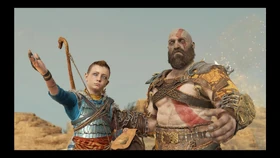
An older Kratos with his son
After destroying Olympus and siring another child in Norway, Kratos becomes a more stoic character, only bursting out in anger when antagonized or threatened. Although he is sometimes prone to outbursts when disciplining his son, he almost always manages to regain control of himself before doing any damage. He also accepts full responsibility for his actions in Greece, often exhibiting extreme sadness and regret, and at times even falling into a state of depression, when confronted about his past behavior. Kratos initially tries to hide his past from Atreus, both out of fear that he will disown him for it, and fear that he will try to imitate his actions.
Unfortunately for Kratos, Atreus appears to have inherited his father's impulsiveness and tendency towards rage. He is alarmed at Atreus' outbursts and is quick to reprimand him for it, fearing that he will become the same monster his father was in Greece. He is shown to love Atreus just as he loved Calliope and Lysandra, telling his son that they would complete the journey together.
However, his distrust for divine beings remains intact, opting to avoid interaction with the Norse Gods whenever possible, even when they (like Freya) try to befriend and help him. He is also shown to still harbor resentment towards the gods of Olympus, promptly telling the spirit of Athena to leave his head the moment she appears. He likewise reassures her that, while he is still a monster, he is no longer her monster.
Kratos now only kills out of self-defense and does not see the point in killing a weakened enemy. He even tries to be the voice of reason when Atreus finds out he is a god and lets it go to his head. Though he does not exactly like being around Brok and Sindri, Kratos is never rude or ill-natured around them and even allows them to work on his weaponry and gear, he was even shocked when Atreus asked why Brok is blue and when he badmouths Sindri, showing that he is at least sensitive enough to know when to not make an enemy.
Due to his slaying of the Gods of Olympus, Kratos now understands that vengeance will not bring him or others peace, even trying to talk Baldur out of killing Freya and then killing him when he attempts to do so to try and end the cycle of children killing their parents. When Freya threatens Kratos and swears vengeance against him, he does not retaliate in anger and simply replies that she does not know him, showing maturity and self-control.
Unbeknownst to Kratos, he and Atreus are destined to have a part in Ragnarok.
Trivia
In Greek Mythology
- "Kratos" means "Power" or "Strength" in Greek, likely a reference to Kratos' god-like physical strength or overall power in general.
- Though Kratos is not a character in actual Greek mythology, there is a being in myth named "Cratos". He is the son of Pallas and Styx and he is the personification of strength and power. The mythical Cratos and the Kratos in-game, however, have vastly different loyalties, whereas Kratos is concerned only for himself and openly despises the gods, while Cratos is utterly loyal to Zeus.
- In Greek mythology, Cratos and Bia were commanded by Hephaestus to imprison Prometheus. Ironically, it was Kratos who released Prometheus from his imprisonment in God of War II.
In God of War Series
- Kratos is voiced by Terrence C. Carson from God of War to God of War: Ascension, and by Antony Del Rio as a child in God of War: Ghost of Sparta. Christopher Judge took over the role for the first PS4 God of War.
- According to a God of War III special feature, Kratos stands 8 feet tall.
- Kratos kills about one god in every game (a total of 14 gods), with the most notable exception being God of War III, where he kills a total of 7 gods.
- Kratos' family is shown to be the only people he has ever truly loved. The only time he has ever been seen smiling was when he found Calliope in the Underworld. Kratos was very distraught when he had to leave her once again. Later, when he encounters an illusion of his late wife, he begs her for forgiveness, something he has never been seen doing before. When he is forced to kill his mother, he is distraught by her passing. When his younger brother Deimos is killed, Kratos is devastated before he unleashes his rage on Thanatos for his actions. He also cares a lot about his second child, Atreus, protecting him on the way during some situations, he is also more concerned about his well-being and temperament, frantically seeking Freya's help because he fell ill from his induced rage, he also disciplines his son like any typical father could.
- From God of War to God of War III, Kratos' tattoo gets thinner and thinner and changes slightly in design. In the first game, it stretches on his chest from close to his sternum to past his left nipple. In the second, it is closer to his nipple. In the final game, it does not cover his nipple at all. It should also be noted that his tattoo in God of War circled more of his left arm, but in the games afterward, it does not. In the 2018 God of War, his right arm's hooked tattoo changed differently to its appearance in God of War III, becoming closer to what it looked like in the original God of War.
- It is unknown why many characters, even if they are fully aware of Kratos' demigod status, still call him a mortal. It could be that they did not feel like calling him a demigod, or that they used it to make him appear weak.
- During flashbacks in God of War III to the events of God of War, the character model for Kratos in God of War III is used instead.
- In God of War II, when Kratos is taken back in time by Atropos to his battle with Ares, his past self's tattoos are very faded in color, almost invisible, until the ending scene where he grabs the Blade of the Gods. Curiously, the tattoos are colored orange instead of red.
- Oddly, he also has the scar from where Zeus stabbed him, despite his battle with Ares occurring long before his fight with Zeus.
- In the Temple of Lahkesis in God of War II, Lahkesis speaks to Kratos through a statue of herself and tells him "only death awaits you in the end of your journey", which Kratos' apparent suicide at the end of God of War III seems to prove correct. However, in the final post-credits cutscene showing the site where Kratos fell, his body is missing, and a trail of blood leads to the nearby sea, leaving his final fate unknown.
- Developer Stig Asmussen has revealed that David Jaffe intended for Kratos to take on the Norse and Egyptian gods after having defeated Zeus and the Greek pantheon. His intention for the former was confirmed with the release of God of War (2018).
- By technicality, Kratos managed to free himself from his past in Chains of Olympus. When he gave up his weapons, powers, and abilities, Kratos' tattoo and pale skin were also removed, thus granting him amnesty. Unfortunately, he was forced to regain everything at the cost of his daughter, Calliope.
- In all of the main installments of the series, Kratos is killed at some point by impalement through his abdomen.
- Also, in each of the main games, he burned a man alive: the first being the Sacrificed Soldier, followed by Prometheus in God of War II, and finally Peiritheus in God of War III.
- Kratos has killed both of his parents in his quests. He is forced to reluctantly kill his mother Callisto in Ghost of Sparta, and brutally killed his father Zeus in God of War III.
- Most of Kratos' actions during the series were driven by rage and vengeance. Some exceptions are when he was searching for the Ambrosia to save his daughter, when saving his brother Deimos while ignoring any and all godly warnings, and when trying to prevent Pandora from sacrificing herself in the Flame of Olympus, and later to spread his second wife's ashes on the highest peak in the Nine Realms (which turned out to be in Jötunheim), accompanied by his son Atreus.
- In the series, when Kratos encounters any of his half-siblings or cousins, he initially does not intend to battle them but is ultimately forced to when they either provoke him or challenge him. Prime examples include both Perseus, Theseus and Hercules.
- In early screenshots of God of War, Kratos' tattoo was in the shape of the omega symbol when it was seen on his head.
- Throughout the God of War series, Kratos casts himself off a ledge in the trilogy. Firstly, in God of War, when Kratos attempts to commit suicide at the end of the game. Secondly, in God of War II, when he plummets down to Rhodes in the beginning. Lastly, in God of War III, when Kratos drops to the Underworld from the Labyrinth. Also in God of War III during his psyche journey, he drops the hope lantern and casts himself into the Pool of Blood.
- Kratos' standard outfit appearance had little changes throughout the games. In God of War and God of War: Ascension, his hands were without any gloves, and he had nothing but white cloth between the chains and the skin of his arms. His belt changes between God of War and God of War II, in the former, he wears a red leather belt, in the latter, he was wearing a gold one, this was kept to God of War III. His skirt is the same as in later games in God of War: Ascension, but seems like it is new and undamaged. In Chains of Olympus, his skirt seems to be torn apart in some places, as in God of War, and you can clearly see his red gloves. As a God in God of War II, while wearing his god armor, the skirt is intact just to be torn apart again after the Colossus of Rhodes smashed him and broke the armor, and the gloves are kept. The final outfit from God of War II is pretty much the same as the one in the sequel. Also, in God of War II and III, Kratos wears a red leather armlet beneath the chains in his arms. The only difference between the two games is that his skirt seems to be shorter in the HD scenes of God of War II and God of War III than that in the gameplay of God of War II. This could be because of his years of trial and error, fighting creatures and gods, that caused his skirt damage. In the new God of War, if inspected closely, one can see of what remains of his old skirt in his waist.
- It is never clearly mentioned how long Kratos reigned as a god, but judging from the 4603 days of working on the Labyrinth, Daedalus has spent a total of 12.6 years working on it. This implies that 12.6 years have passed between God of War and God of War III.
- With this information, one can assume that Kratos was born between 510 BC ~ 500 BC and that God of War III finished around 470 BC ~ 460 BC, as he spent about 12 years as a god, 10 as a slave to Olympus, and even before, he fought at Eurybiades' side against the Persians and their King (probably Xerxes I), event that took place in 480 BC (approximately). Judging by his voice pattern and physical appearance, his age in God of War III is estimated around 40 ~ almost 50 years.
- However, these years are contradictory with the appearance of Archimedes' corpse and his inventions in Ascension and Ghost of Sparta, respectively, given that Archimedes died c.212 BC. The Colossus of Rhodes' appearance also supports a more recent setting, as the construction of the statue began in 292 BC, and ended around 280 BC. It was then destroyed in an earthquake in 226 BC. With this information, one can assume that in the God of War universe the statue was then nearly reconstructed around 36 years later (as it is shown unfinished in the events of God of War II). All this suggests that Kratos was actually born between 230 BC ~ 220 BC and that God of War III finishes between 190 BC ~ 180 BC.
- To explain Eurybiades' appearance in Chains of Olympus, one should assume that the conflict did not take place in the Greco-Persian Wars, and that the fallen commander was actually named after Eurybiades. This is supported by the fact that he is listed as "Leader of the Athenian Army", when historically, Eurybiades was a Spartan Commander. Another reason that supports this notion is that the original Eurybiades historically survived the Greco-Persian Wars, while the character from Chains of Olympus is shown unconscious and severely injured.
- Prior to being revealed to be the Marked Warrior, who the prophecy foretold the end of Olympus would be at his hand, Kratos was said to be marked by many individuals. The village oracle who cursed him when she bonded the ashes of his family to his skin stated that the mark of his deeds would be visible to everyone, and a spider he encountered during his quest to destroy the Ambrosia to stop the followers of Ares from reviving him stated he is just a mortal marked with destruction. Kratos also took a tattoo identical to his brother's birthmark.
- One of Kratos' most major characteristics is his always angry facial expressions, he kept this expression to his life in Midgard. He is almost never seen smiling. However, in the ending of God of War: Ascension, it is the most explicit time in the series that Kratos appears to be extremely sad and desolate, judging by his facial expressions, in the live-action trailer for the game, Kratos is seen geniunely smiling joyously while lifting up his daughter, before she turns into ash, fusing with Kratos' skin, and falling into despair.
- Kratos' fighting style changes throughout the game as he becomes more and more experienced. In God of War: Ascension he uses the Blades of Chaos to perform grabs while in all other games he prefers to overpower his enemies by grabbing them with his hands. In God of War III, many of his moves are slightly faster than the older games. Also in God of War III he disarmed and acquired the weapons of 5 different gods/demigods, more than any other game, while in God of War: Ascension, he only uses his Blades of Chaos, the least of all the game (in God of War: Ghost of Sparta he acquired the Scourge of Erinys and is considered having godly weapon/power).
- While on the Boat with Atreus, if Mimir is not present by this time, Kratos will count famous stories such as The Hare and Tortoise, Frog and Scorpion, however he will tell the tale of a horse who wanted revenge, the horse allowed someone to ride him meet his desire for revenge, but losing his freedom. Implying this story is of Kratos.
- When speaking with Freya about Helheim, he implies that he is familiar with the Greek Underworld, however not the Norse realm of the dead.
- While in Hel, Kratos witness a reenactment of the final battle with Zeus at the end of God of War III, however, the models for both Zeus and past Kratos looked to be remade from the ground up.
- The remade models for Kratos is not accurate to what happened, The Golden Fleece was destroyed and was using the Blades of Exile. This is probably a goof, as in all previous games had.
- Kratos can hear his past self screaming at Zeus, because of Judge taking over as the voice of Kratos no re-used voice clips of TC Carson are used, instead the lines are re-done.
- While in Tyr's chambers he finds a vase that contains Lemnian wine, from the island Lemnos, near from his home of Sparta. He and Atreus drink the Centuries old wine, Atreus is disgusted by it, while Kratos enjoyed it, probably still retaining his bold nature as a Spartan.
- Kratos tells Atreus that he has met many annoying spirits before, he could be implying Athena, or the many times he has faced undead foes like Alrik, or when he was inside his mind and heard the voices of all the dead, or maybe the screams of his father's original family whom he unknowingly slaughtered.
- When asked by Atreus if he can transform into an animal, Kratos stops to think, as the only god he has ever seen shapeshift was Zeus before he met Freya, but does not know how, but is open to try.
- He is known by the giants as Farbauti (ᚠᚨᚱᛒᚨᚢᛏᛁ), literally meaning "cruel striker", a fitting name for Kratos' former demeanor.
- After defeating the Valkyire Queen, Kratos gets into a cheery but sarcastic mood, not because he has set those imprisoned free, but rather he could sell off the remaining Valkyrie helmets to the Dwarves.
- As part of his Greek Clulture and of his past, he treats Atreus in a different way than he did with his daughter Calliope, as Spartans at a young age where tought how to fight and survive at young ages.
- When he reveals his past to Atreus, that he has killed those who were deserving, such as Ares, Persephone, and Thanatos, while he has slaughtered those who were not, such as his mother, brother, Athena, and The Greek Gods.
- During some side missions, Kratos and Atreus learn of people killing their Fathers, which Atreus finds a little surprising, while keeping his cool, while Kratos stays silent as to hide his sins from what happened in Greece.
- Similar to Zeus, he would call Kratos "My Son" and on occusion say his name, Kratos does the same calling Atreus only boy, only using his real name to discipline him.
- Since his second wife Faye is Laufey and his son Loki, Kratos takes the place of the giant Fárbauti. Quite fitting as the name means "he who strikes dangerous blows," in relation to Kratos' physical prowess and skill in combat.
Guest Appearances
- Kratos makes a guest appearance in Soulcalibur: Broken Destiny. He fights with the Blades of Chaos, Blade of Olympus, Icarus Wings, and Poseidon's Rage.
- The God of War Armor makes an appearance in Heavenly Sword. On a mission with the character Kai, the player enters an armory with a display of her mother's skeleton. One of the other displays is the God of War Armour with the Blades of Chaos underneath. The inscription reads to the effect of "Armour of the Prince who stood alone against the Persian Army." This was confirmed by Ninja Theory (the developer of Heavenly Sword) as accreditation to the God of War series for being such a heavy influence to their own production.
- In the 2008 The Simpsons Game, a parody of Kratos can be seen in the background of a level on a billboard. The words "God of Wharf" are written next to a picture of a Simpsons-esque Kratos eating a bowl of chowder.
- Kratos makes a guest appearance in the PS3 golf game, Everybody's Golf: World Tour. Playing with the 'Clubs of Olympus', a set of clubs with the club heads attached to chains, Kratos is portrayed being quite rude to his caddy, blaming all his bogeys and missed shots on The Sisters of Fate.
- The PS3 exclusive kart racing game ModNation offers Kratos, and his Kart of Chaos, as a playable character when pre-ordering. Kratos, along with other pre-order incentives, were made available worldwide.
- In 2009's Game of the Year LitteBigPlanet, there is a rare character costume of Kratos, as well as Medusa and Pandora's Guardian.
- Kratos appears in the PS3 version of the 2011 game Mortal Kombat, with his own set of moves, and a personal God of War battle arena. He is not, however, a part of the storyline.
- In the game Age of Mythology and its expansion, The Titans, there is a character named Kastor. Interestingly, his name can be arranged into Kratos. His background shares slight similarities to Kratos', as he too distrusted the gods and sided with the Titans while, unbeknownst to him, being used as a pawn. Kastor, like Kratos, is a figure in Greek myth, invaded Mount Olympus, released the Titans, and fought them after being betrayed. It's worth noticing that AoM and its expansion was released 2 years before the first God of War.
- However, there are some rather odd similarities between AoM and GoW. AoM main character, Arkantos is aided by Athena just like Kratos, Carole Ruggier also voiced Athena in AoM, both of them are general of their army and Arkantos is devoted to Poseidon as Kratos to Ares. Arkantos, not unlike Kratos, also escaped the Underworld and soon betrayed by the god they are devoted to and AoM Poseidon, just like GoW Ares, betrays his fellow gods because of envy and Arkantos fights and defeats the god that betrayed him and his people after being empowered by Zeus. (In this instance, Arkantos fights the statue of Poseidon is similar to Kratos fights Colossus of Rhodes, and he is given powers by Zeus to defeat it, just like Kratos is given the Blade of Olympus). Athena then makes Arkantos a god as Kratos is made one by the same goddess at the ending.
- Kratos is one of the playable characters in the multi-franchise fighter Playstation All-Stars: Battle Royale, similar to the Super Smash Bros. series. Along with him, God of War-franchise member Hades also makes an appearance, albeit as a background character. Zeus also appears as a playable DLC Character in the game. Kratos' rival is Sweet Tooth from Twisted Metal.
- In God of War: Ghost of Sparta there was a piece of artwork for a female version of Kratos. This was possibly cut due to its nudity and voice acting.
- A God of War themed event was added in Destiny of Spirits, alongside advanced summons which had Kratos in it.
- Kratos appears in the PlayStation 3/4/Vita versions of Shovel Knight.
Other Media
- Kratos was voted as the "Manliest Man in Video Games" by ScrewAttack.com. The website also pitted him against Spawn from the Spawn series in the popular series Death Battle where he ended up losing.
- 7-Eleven featured a Slurpee drink called "Kratos Fury" in a promotion for God of War III.
- David Jaffe showed interest in having Djimon Hounsou portray Kratos in the upcoming God of War film. With the film currently in development hell, there are no updates on Hounsou's possible involvement, nor on the film itself.
Gallery
External links
- Kratos at the Soulcalibur Wiki
- Kratos at the Mortal Kombat Wiki
- God of War dedication blog at Tumblr.com
- Kratos at MUGEN Wiki
- Kratos at P.A.S.B.R. Wiki and Kratos' gameplay
- Kratos profile (old) version 1
- Kratos profile (old) version 2

















































































